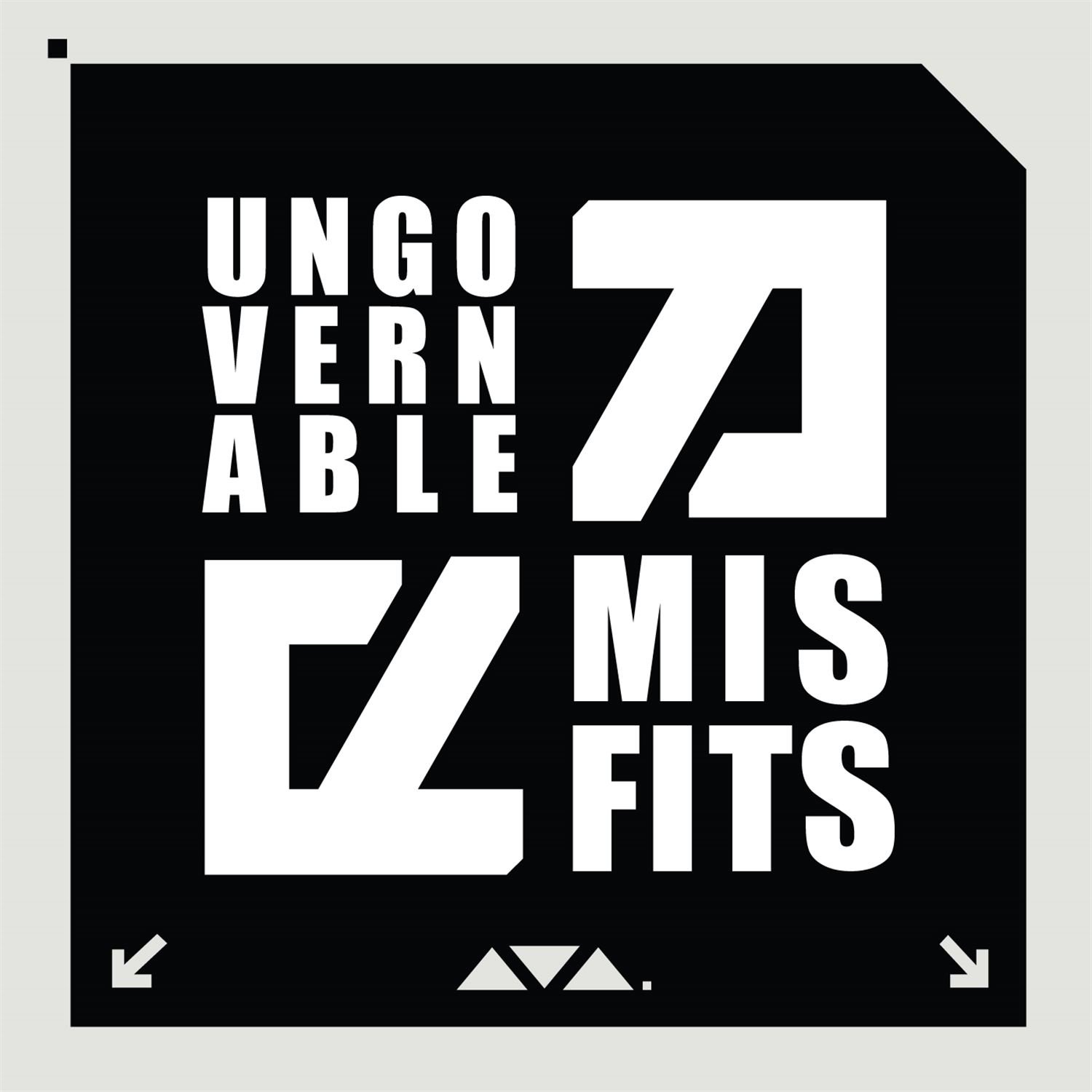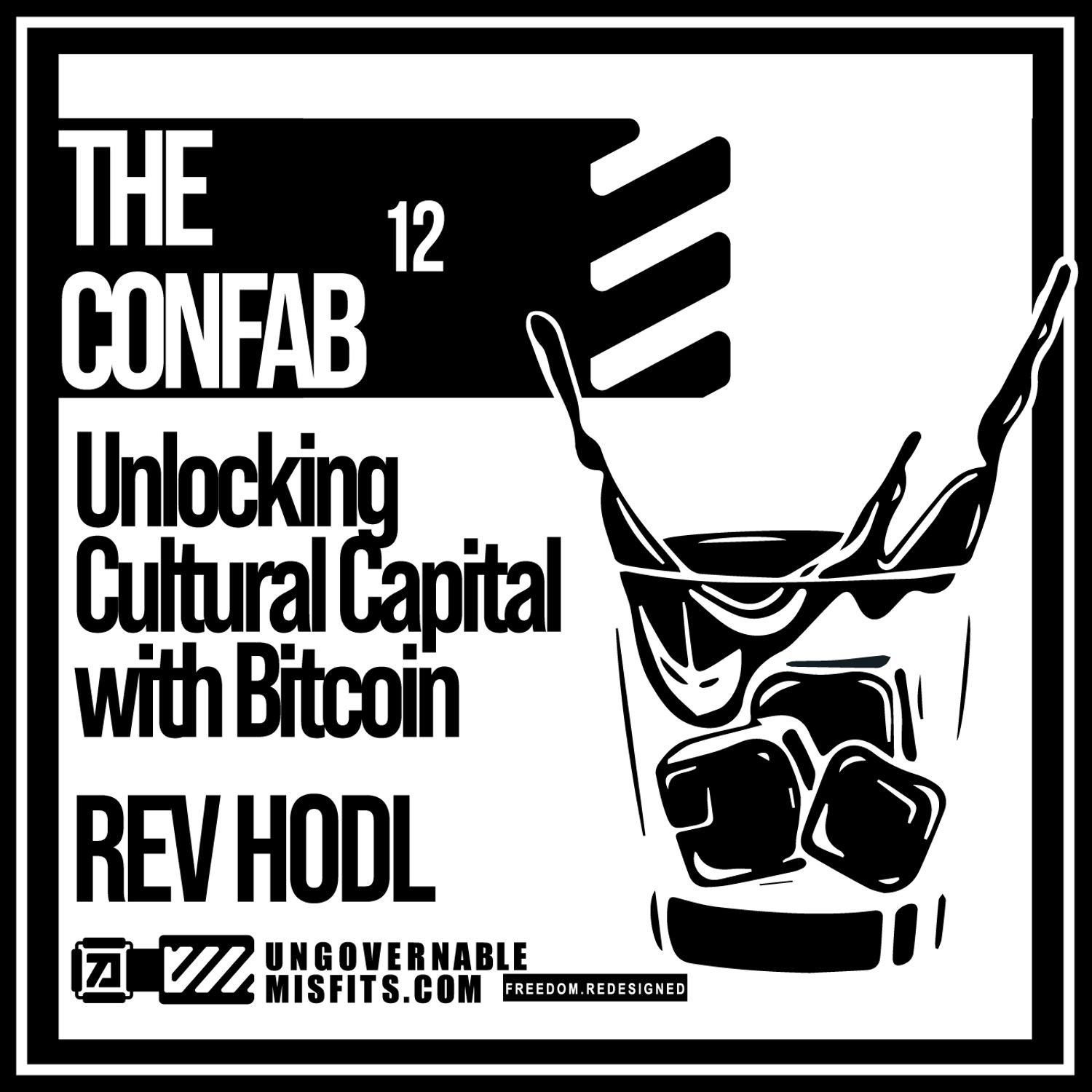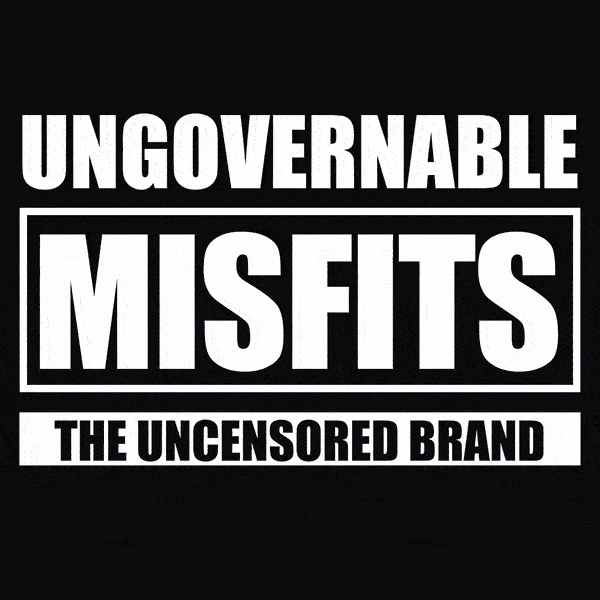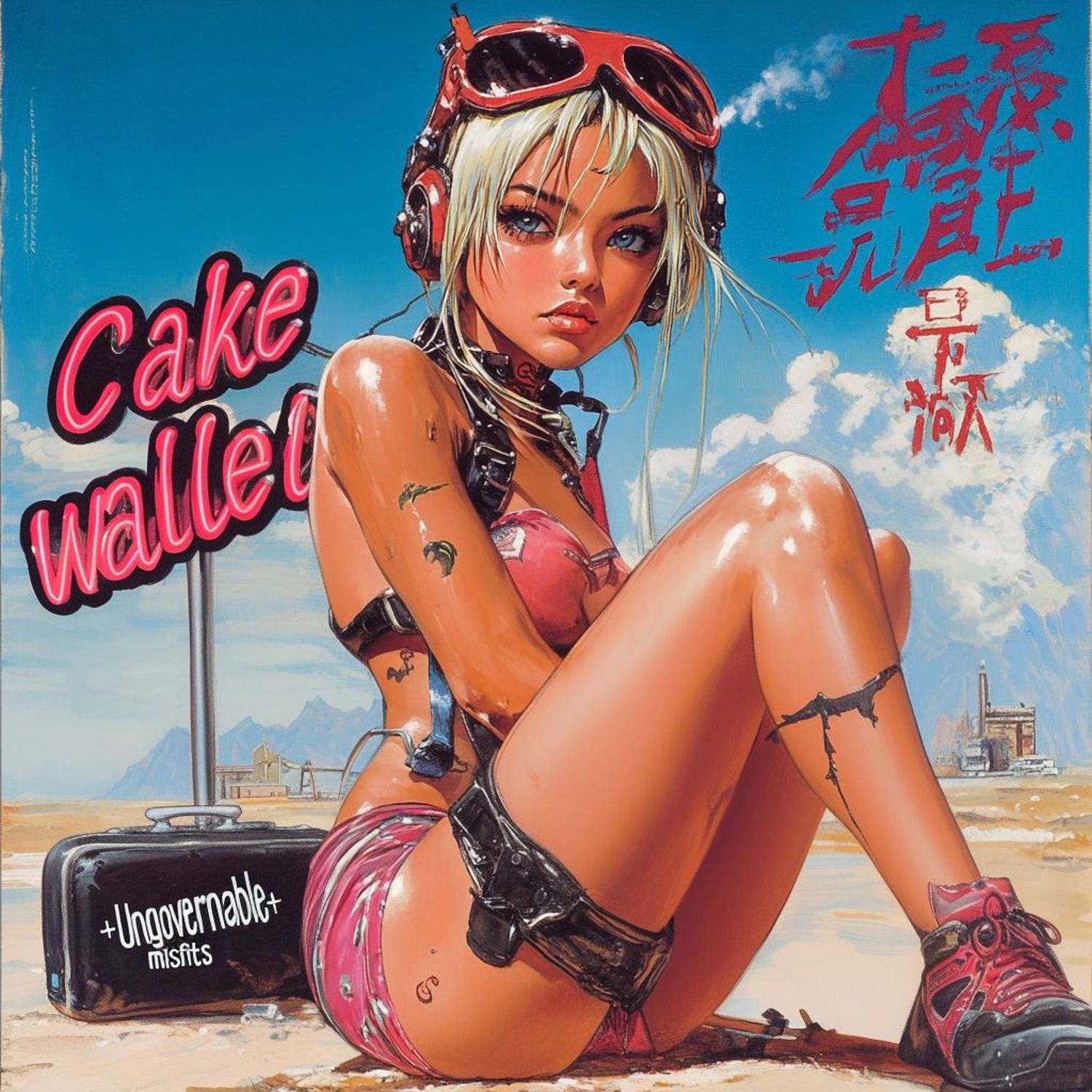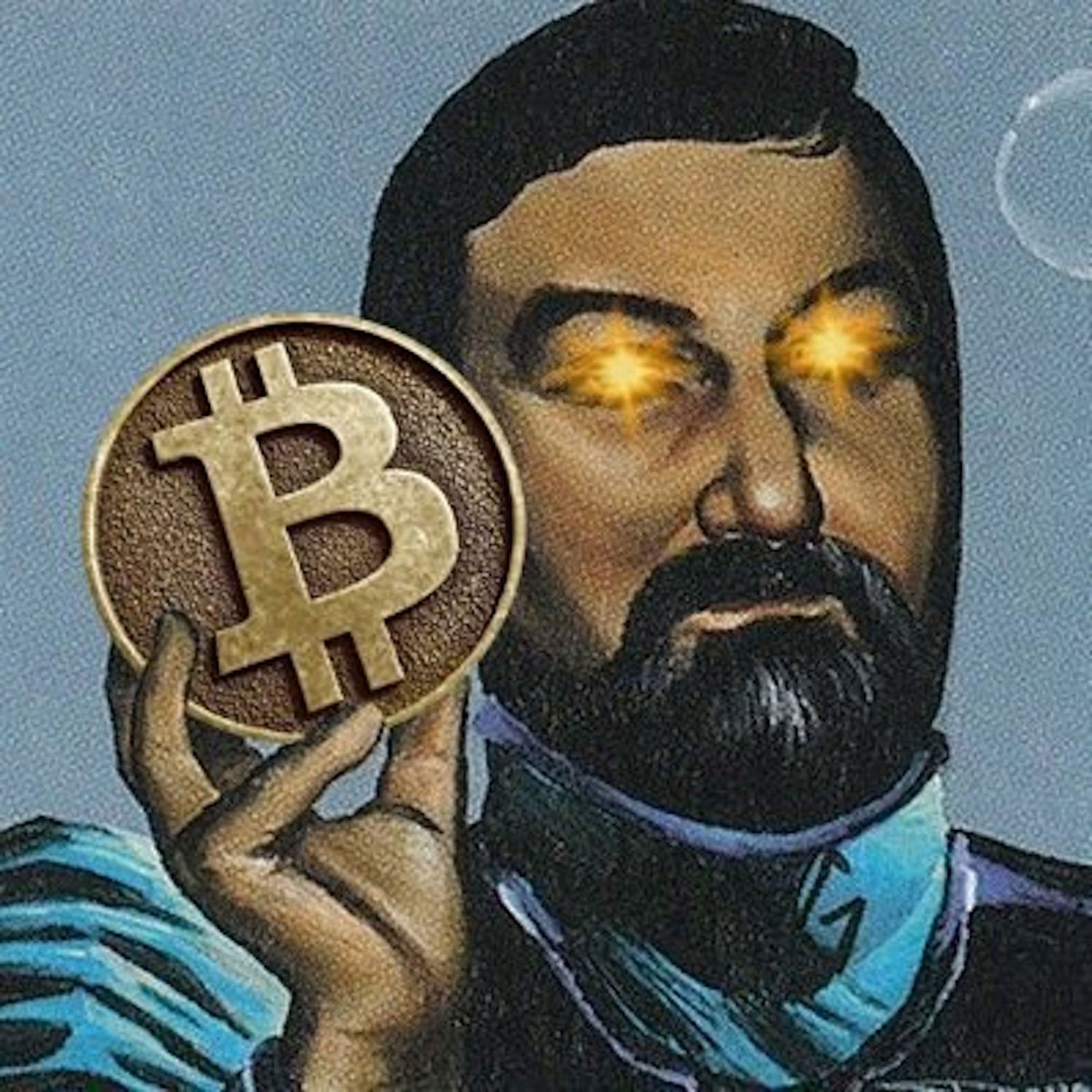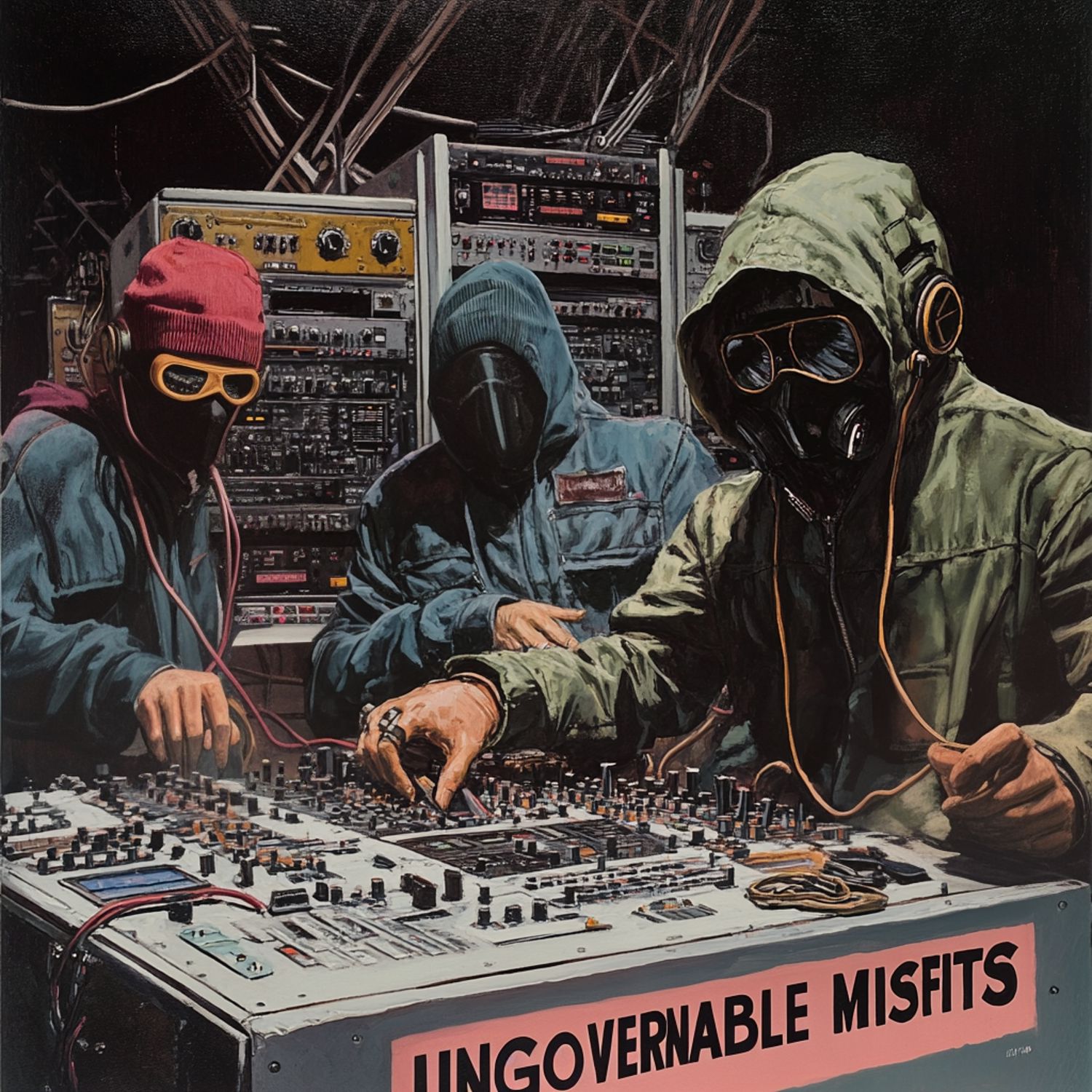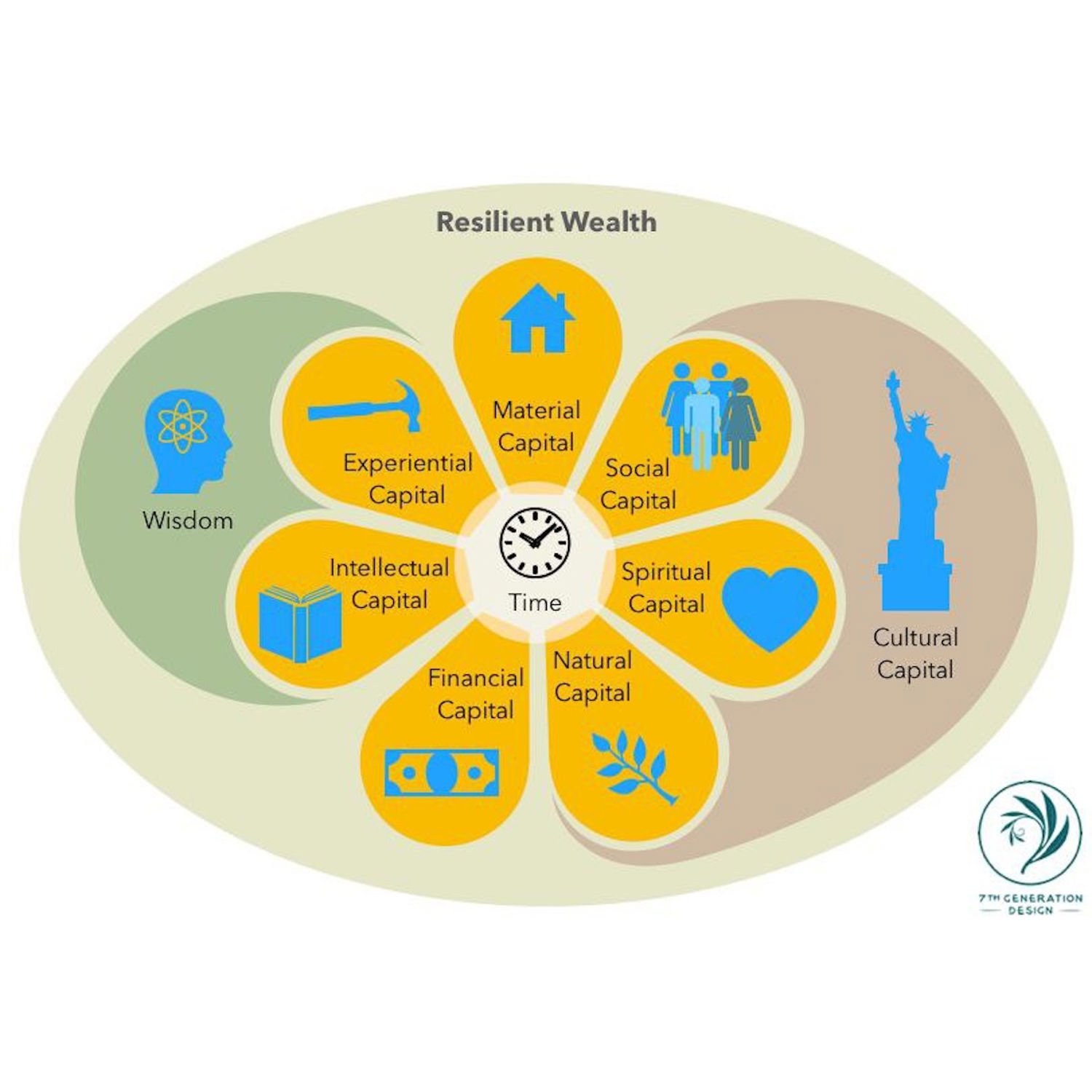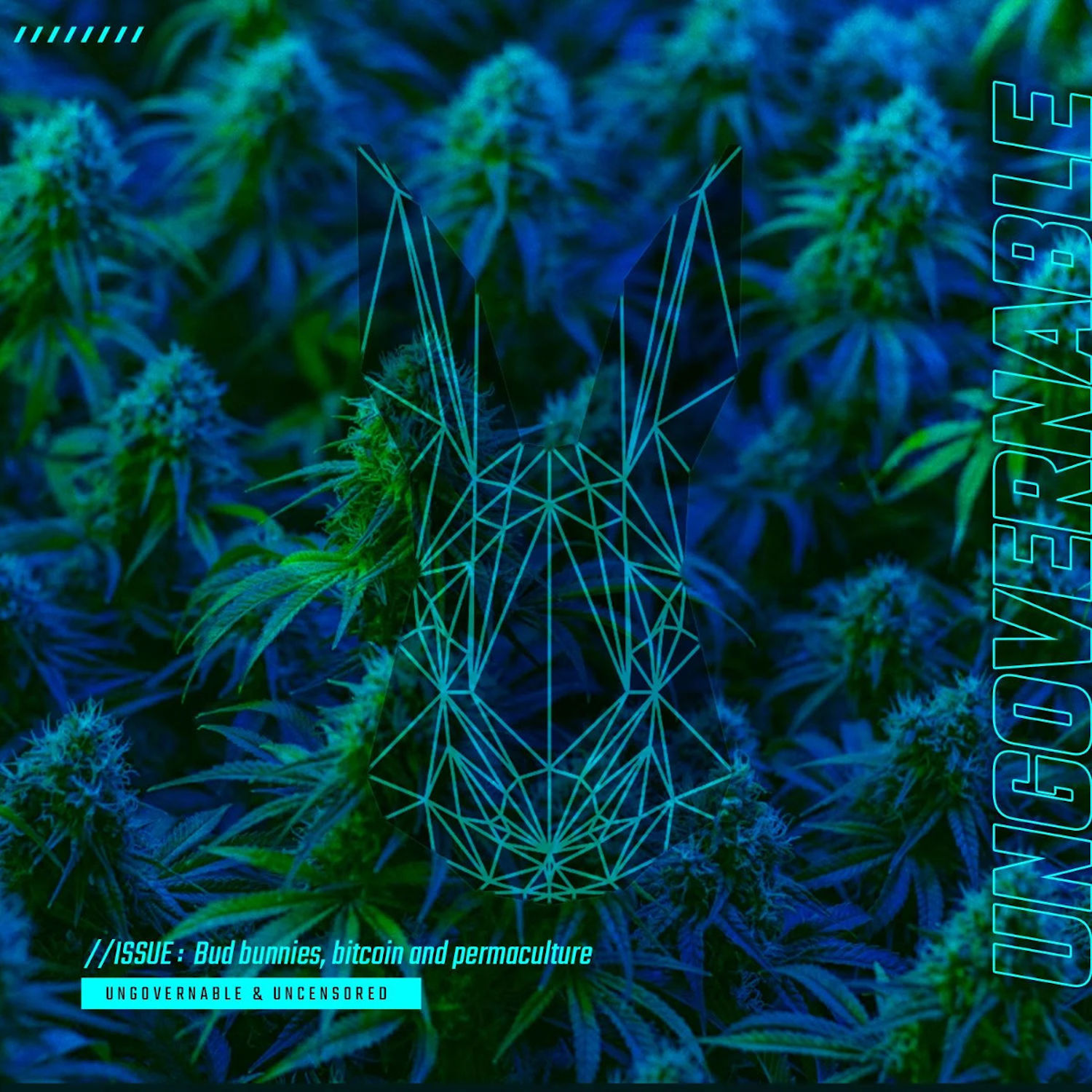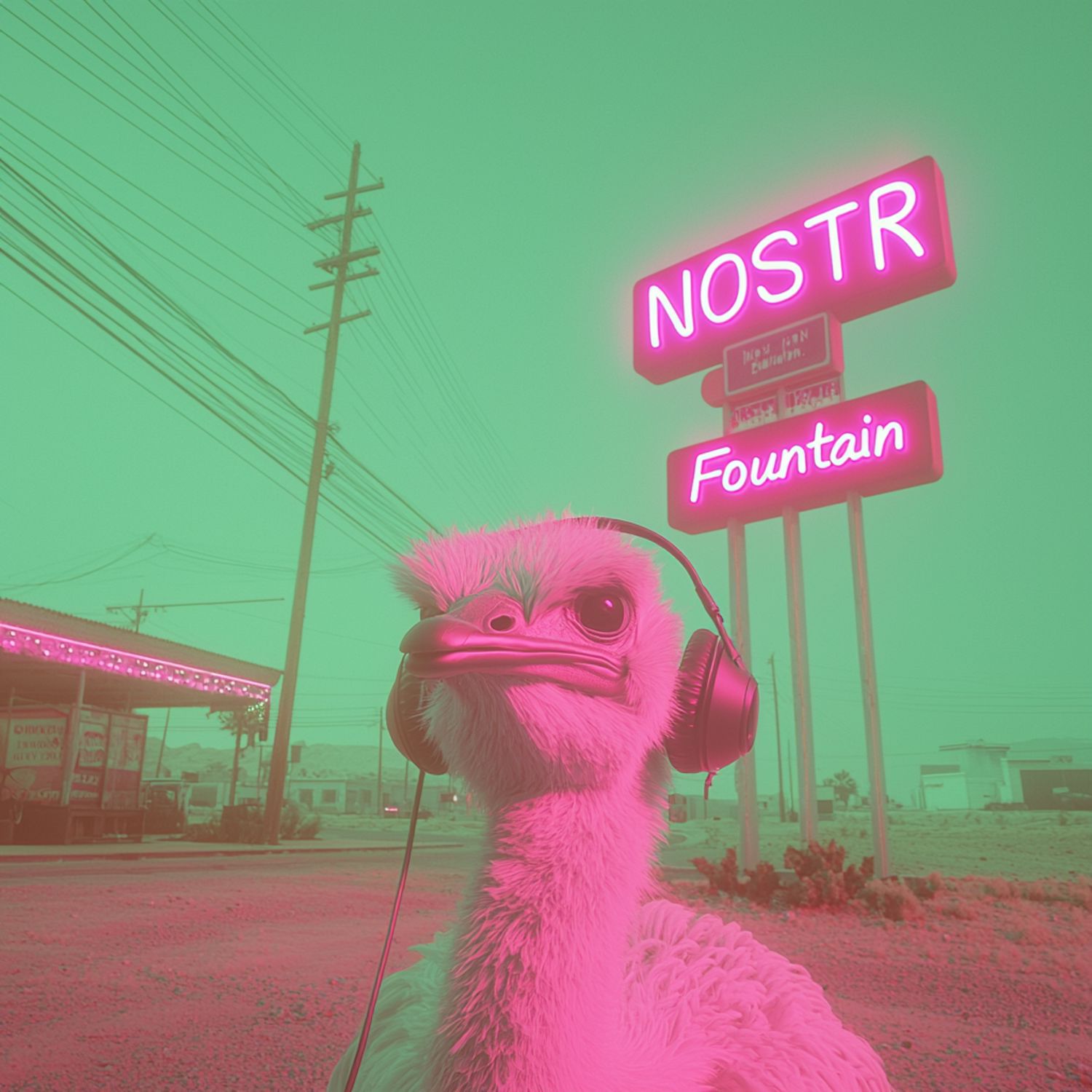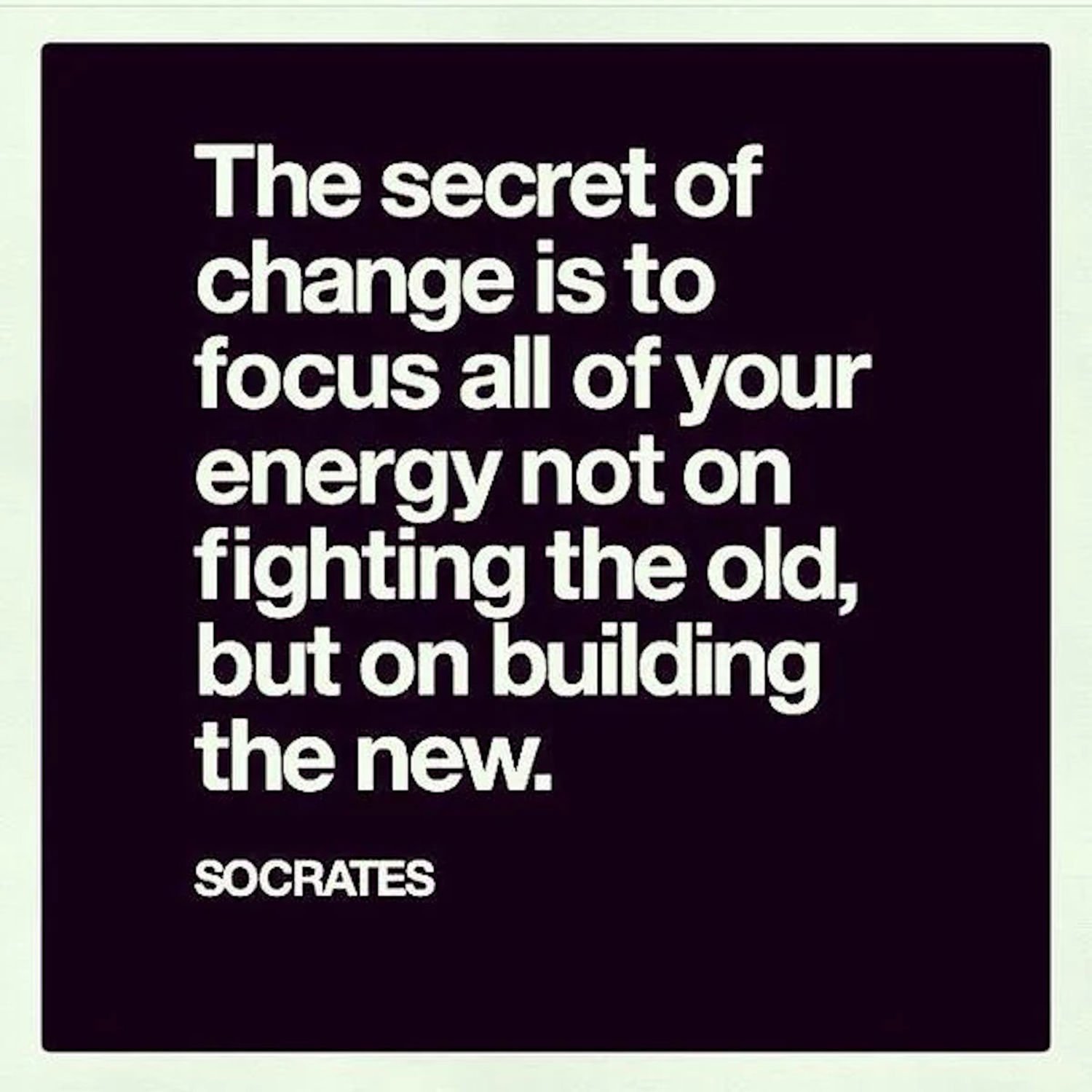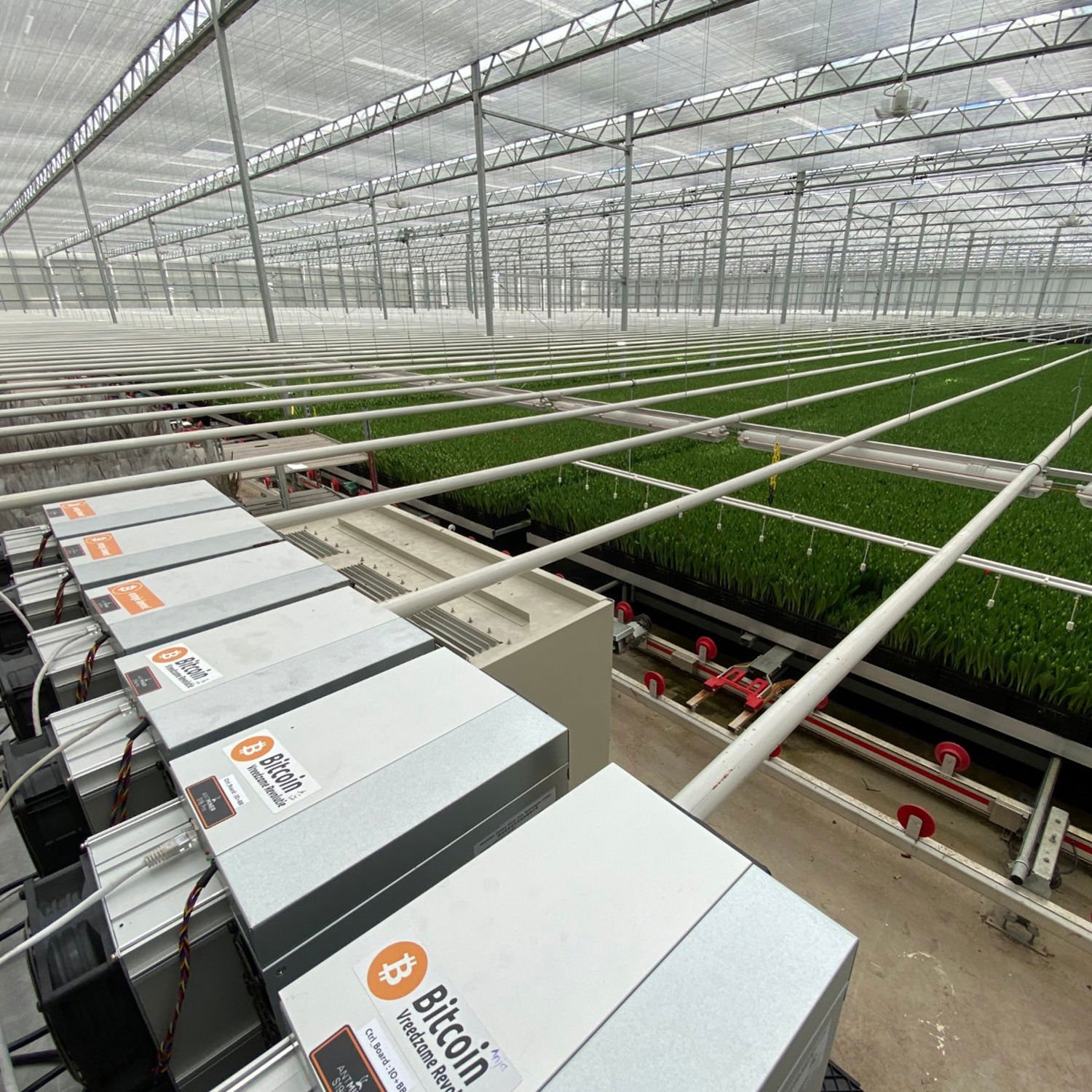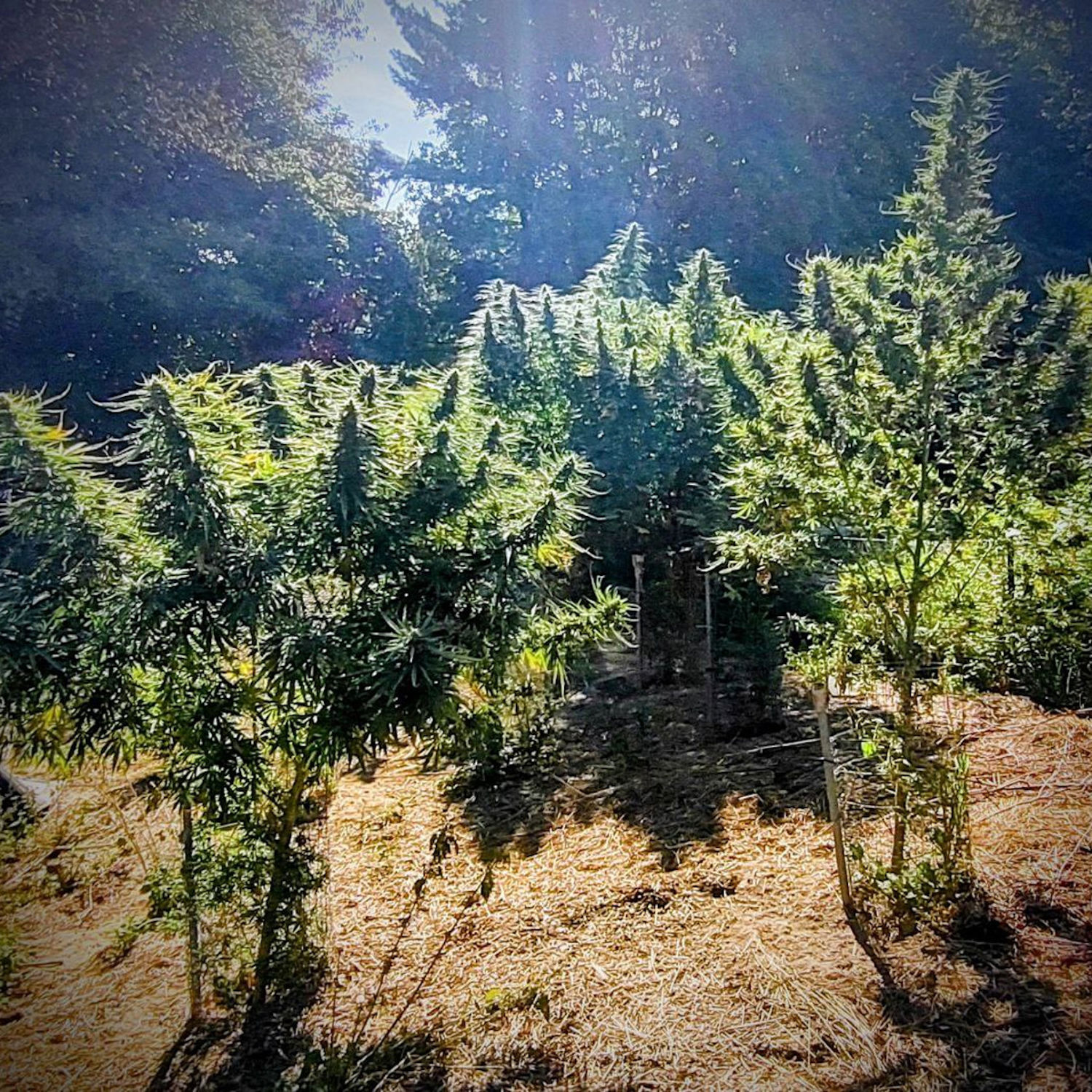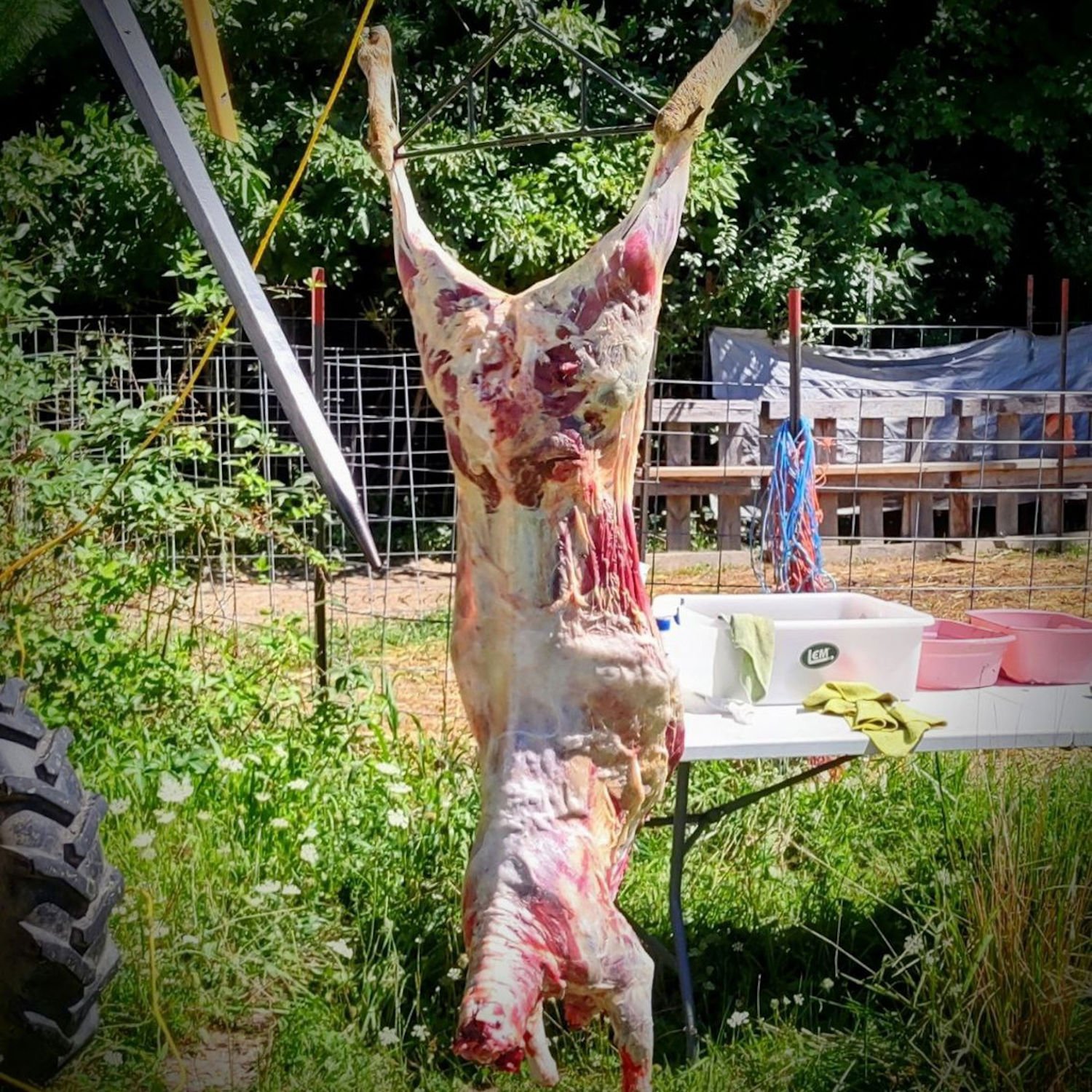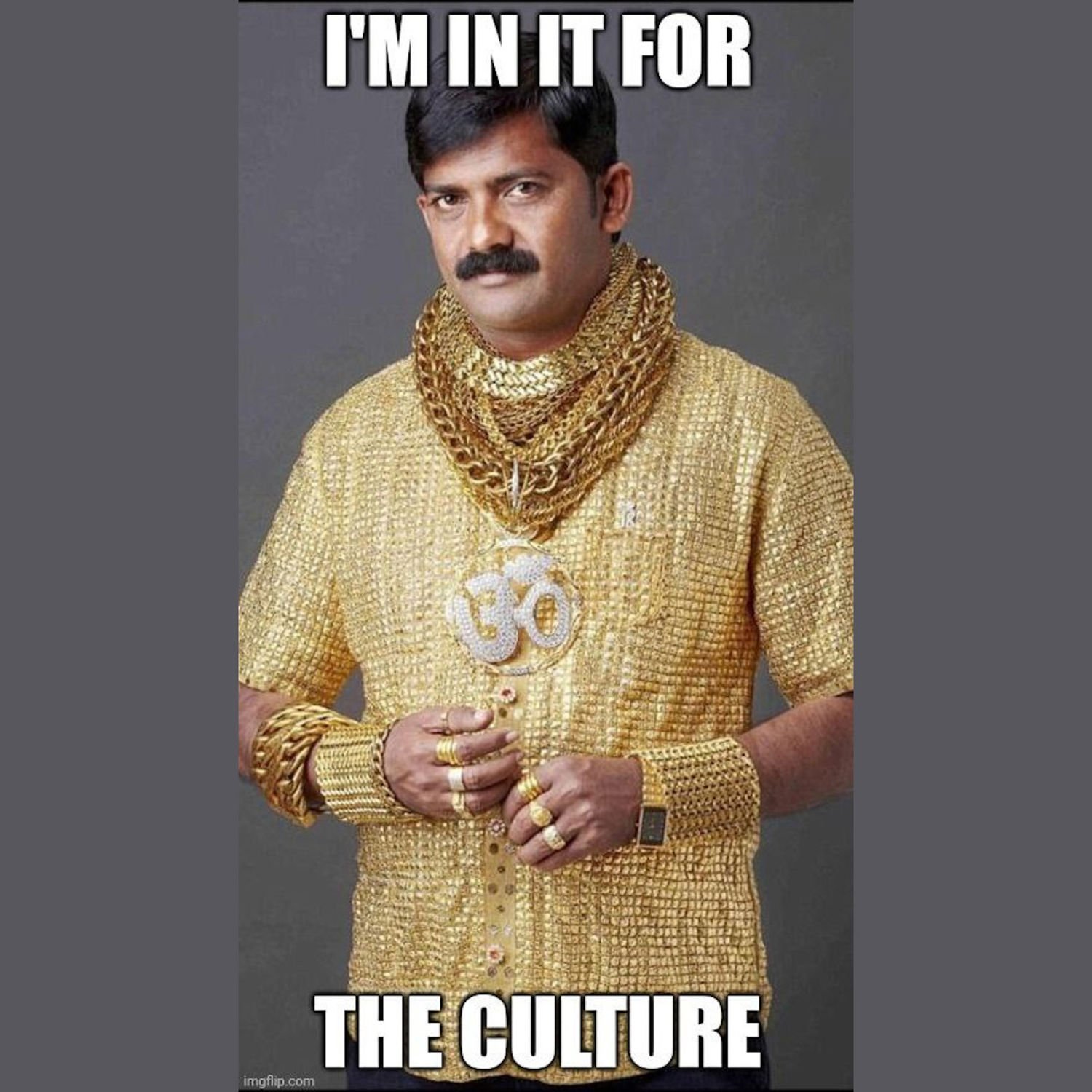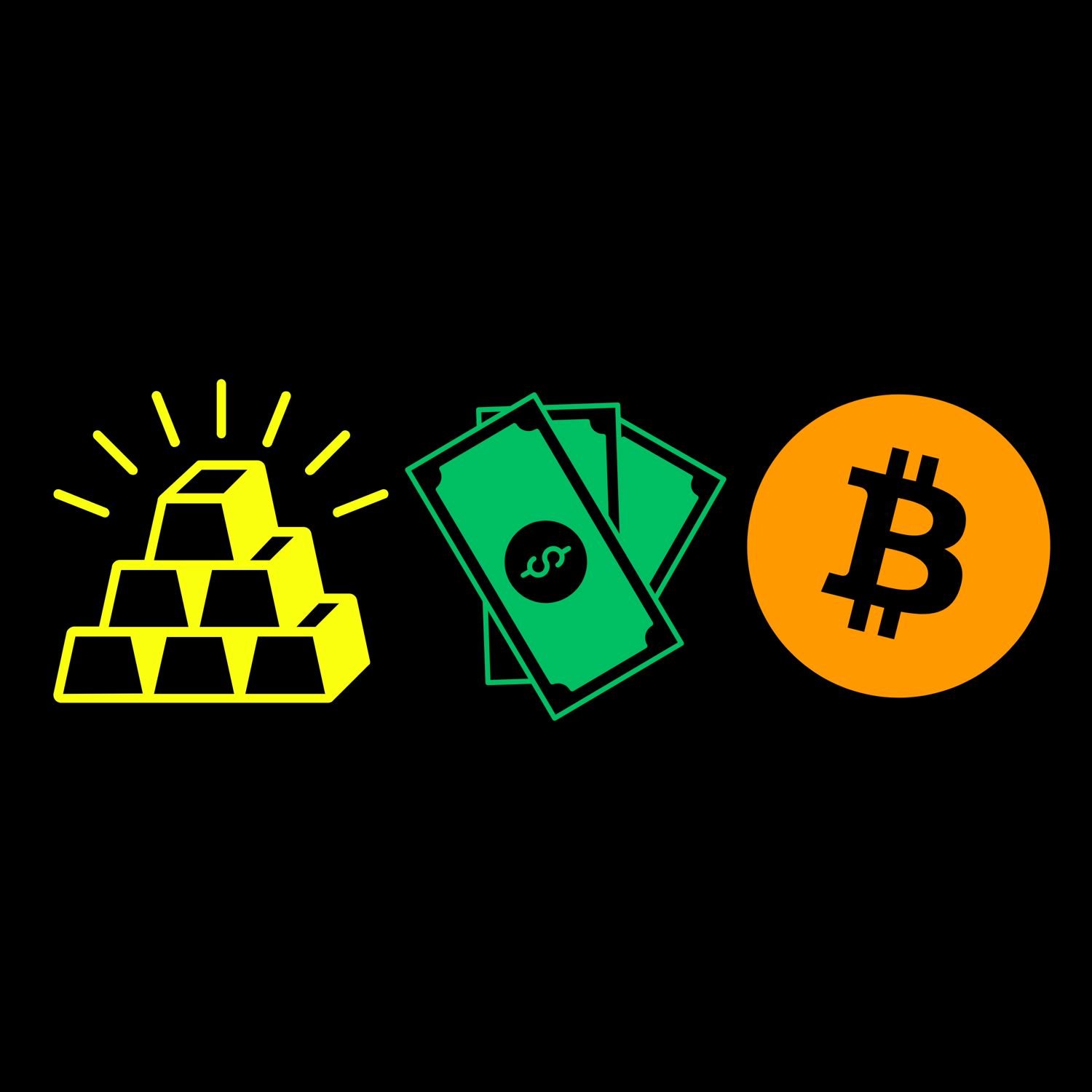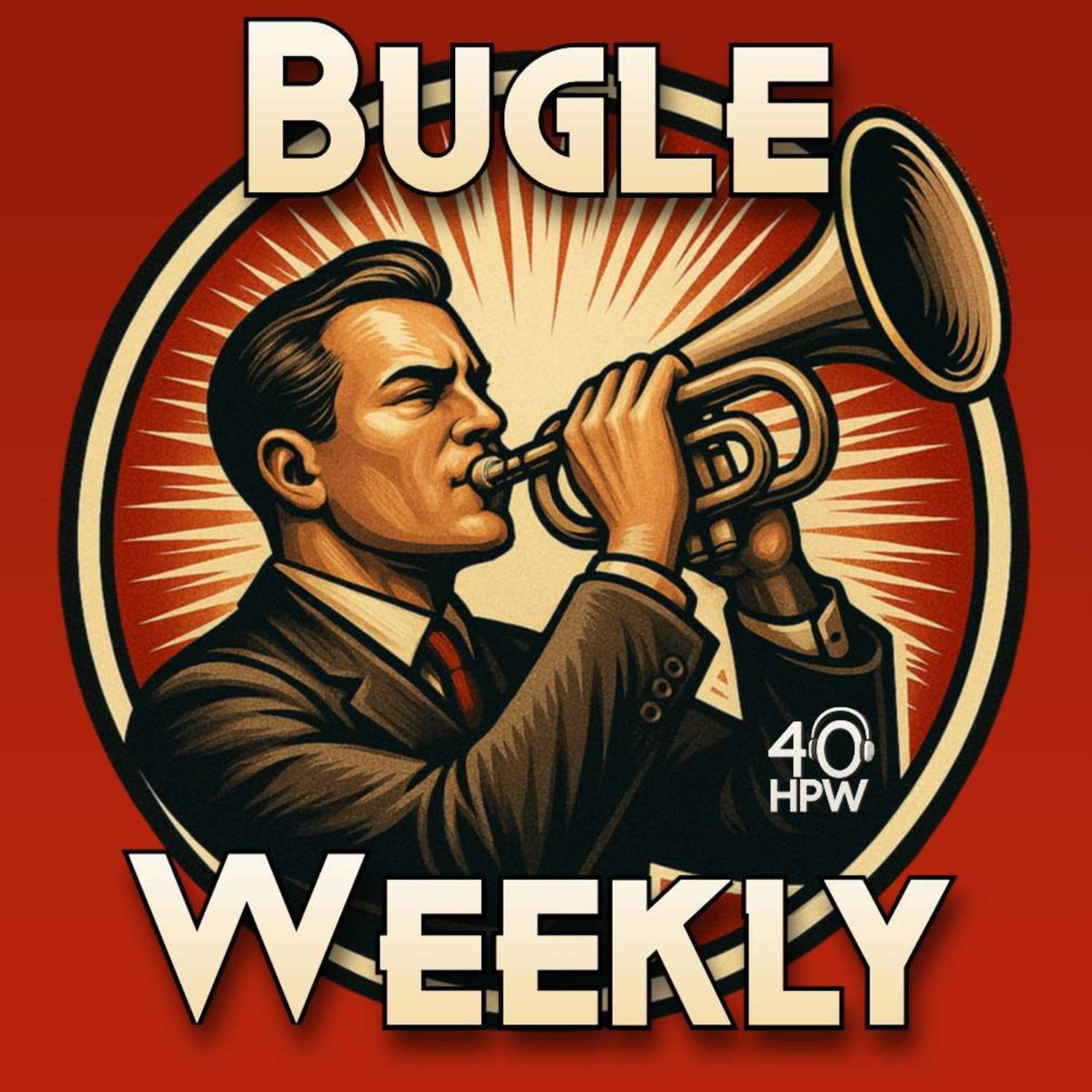Welcome to the The Confab, the term derives from "confidential talk", which was commonly used in the Prohibition Era for meetings and conversations that took place in the smoky, rule-breaking speakeasies of that time.
The informal, privacy focused and clandestine nature of Ungovernable Misfits lends itself to these discussions. So, grab a seat and a stiff drink from the concealed bar, listen and revel in the conversation.
On this episode, permaculture expert, pleb miner and Meshtadellian Rev Hodl rejoins the show to talk about nostr, cultural capital and the happenings on the Michigan homestead.
SHOW DISCUSSION
Rev Hodl discusses his efforts to build a self-sustaining, circular economy centered around his Bitcoin-focused homestead. He explains how he integrates various systems like rabbit farming, cannabis cultivation, and Bitcoin mining to maximize efficiency and minimize waste.
A key focus is developing a local Bitcoin community in Michigan, where Rev Hodl shares his knowledge and excess production with other Bitcoiners. This allows him to distribute his natural capital, like food and seeds, while also learning from others and strengthening the cultural capital of the group.
Rev Hodl emphasizes the importance of avoiding centralized, KYC-based interactions in favor of building a decentralized, peer-to-peer economy within the Bitcoin community. He sees this as crucial for developing true resilience and self-reliance, rather than relying on traditional financial systems.
Throughout, Rev Hodl highlights the permaculture principles guiding his approach - minimizing waste, maximizing productivity, and cultivating mutually beneficial relationships. He sees this as a model for how Bitcoin communities can thrive by focusing on the holistic development of various forms of capital, not just financial.
- 8 Forms of Captial: https://www.7thgenerationdesign.com/creating-resilient-wealth/
- Michigan Bitcoiners: https://michiganbitcoiner.com/
- Nostr: https://njump.me/npub1f5pre6wl6ad87vr4hr5wppqq30sh58m4p33mthnjreh03qadcajs7gwt3z
- 1st Podcast Appearance: https://ungovernablemisfits.com/podcast/bud-bunnies-bitcoin-and-permaculture/
[[LINKS]]
SHOW SPONSORS
FOUNDATION
https://foundation.xyz/ungovernable
Foundation builds Bitcoin-centric tools that empower you to reclaim your digital sovereignty.
As a sovereign computing company, Foundation is the antithesis of today’s tech conglomerates. Returning to cypherpunk principles, they build open source technology that “can’t be evil”.
Thank you Foundation Devices for sponsoring the show!
Use code: Ungovernable for $10 off of your purchase
CAKE WALLET
https://cakewallet.com
Cake Wallet is an open-source, non-custodial wallet available on Android, iOS, macOS, and Linux.
Features:
- Built-in Exchange: Swap easily between Bitcoin and Monero.
- User-Friendly: Simple interface for all users.
Monero Users:
- Batch Transactions: Send multiple payments at once.
- Faster Syncing: Optimized syncing via specified restore heights
- Proxy Support: Enhance privacy with proxy node options.
Bitcoin Users:
- Coin Control: Manage your transactions effectively.
- Silent Payments: Static bitcoin addresses
- Batch Transactions: Streamline your payment process.
Thank you Cake Wallet for sponsoring the show!
VALUE FOR VALUE
Thanks for listening you Ungovernable Misfits, we appreciate your continued support and hope you enjoy the shows.
You can support this episode using your time, talent or treasure.
TIME:
- create fountain clips for the show
- create a meetup
- help boost the signal on social media
TALENT:
- create ungovernable misfit inspired art, animation or music
- design or implement some software that can make the podcast better
- use whatever talents you have to make a contribution to the show!
TREASURE:
- BOOST IT OR STREAM SATS on the Podcasting 2.0 apps @ https://podcastapps.com
- DONATE via Monero @ https://xmrchat.com/ugmf
- BUY SOME STICKERS @ https://www.ungovernablemisfits.com/shop/
(00:04:50) THANK YOU CAKE WALLET
(00:06:35) THANK YOU FOUNDATION
(00:07:57) Krazy Karl's Corner
(00:09:53) The Value of Podcasting
(00:12:12) Developing Multiple Forms of Capital
(00:17:27) Non-Extraction is Key
(00:20:57) Bud Bunnies: Expanding Natural Capital Through Cooperation
(00:26:01) Leveraging NOSTR for Building Cultural Capital
(00:40:07) Become the Bitcoin Mechanic
(00:43:55) KYC is the Biggest Threat
(00:47:52) Double Spending Your Time
(00:52:08) Seeds Over Weeds
(01:00:50) Butchering the Red Tape
Bitcoin is close to becoming worthless.
[00:00:11] Unknown:
Bitcoin.
[00:00:16] Unknown:
Now what's the Bitcoin?
[00:00:19] Unknown:
Bitcoin's like rat poison. Yeah. Oh. The greatest scam in history. Let's get it. Bitcoin will go to fucking 0.
[00:00:41] Unknown:
Welcome back. This episode is with Carl. If you haven't yet listened to our first episode, bud bunnies, either check-in the show notes. I'm sure Jordan will have linked it. And if he hasn't, you can search on the Ungovernable Misfits website or in any of the podcast players. I always enjoy speaking to Carl. He's doing some really cool things, and we have a lot to learn from him. Before we dive into this episode, I just wanna say thank you to everyone who boosted the last show with fundamentals, and I'm gonna read through some of the top boosts before we start. Late stage huddle with 33,333 SATs.
Hell, yeah, boys. Great conversation. Thank you, late stage huddle. I really do appreciate all the support. Shadrach, 23,122 SATs. Lincoln note. Lincoln note. By my calculations, Shadrach is streaming at about 300 sats per minute. Unheard of. Well, thank you, Shadrach. We appreciate you, mate. Speak of the devil. Fundamentals with 21,000 sats. I should listen and make sure Max didn't just interview me only to play Kamala Harris soundbites after asking me questions. I think this is an important conversation. While I didn't mention it, attacks on samurai are motivated, I believe, by institutional simping, a desire to make the space more palatable.
Imagine making that personal trade off only to find out that some institutions were coming anyway because they had no choice, but the rest would sell their Bitcoin at the first sign of trouble. It's just not worth it. It's just not worth it. It's it's just not worth it. That's what he typed. Zed wart it or zwart it with 21,000 sats. You should start a separate podcast altogether. Thoroughly enjoyed this talk. Rod Palmer with 21,000 sats. Fundamentals can't resist the chance to name drop Alan Farrington. Alan Farrington goes to my Bitcoin meetup.
Business cat with 11,111 sats, Satchel of Richards, powerful. Chad Farrow with 10,000 sats. Great episode with fundamentals. 8 Myth Randy with 7,777 sats. This fundamentals guy is my kind of Bitcoiner. Me too. We love fundamentals here. Spencer. Yes. Fuck the scale, bros. Mommy can't use it. We need to onboard a 100,000,000 users next week. Man, these sort of ideas have kept me so lonely in Bitcoin. Love to hear someone on the same page. Spencer again with 6,969 sat. So nice listening to fellas that get it. These ideas that frustrate the meetup attendees who wanna have the same old convo about fiat mining off Bitcoin and jerking off sailor. Those are the ideas that ring true to me. Great convo, fellas. And final boost from Chad Farrow with 3,333 stats.
Any podcasting 2 point o or no agenda listeners out there looking for more philosophical takes on Bitcoin, check this out. Max, Ungovernmental Misfits and Fundamentals are both stand up guys, and this is a great conversation. Thank you, Chad Farrow. I appreciate that. And thank you, Fundamentals, for coming on. Thank you also to Vake, Blazer, John Gold, Abel, or a b I l e, FOMO Metronic, Dan, Bitcoin Boomer, BTC on board, Cyborg, and for all boosting as well. I would read these, but I would need another separate show. But thank you to everyone, I really do appreciate it. Before we start, I just wanna say a quick thank you to our sponsors.
I'll start with cake wallet, our new sponsors. It took me a long time trying to sift through and find people that ungovernable misfits would work with. It might sound like it's easy, but there's a lot of scammy bullshit in the space. There's lending and thieving and everything else that goes along with it. And to find a company that just builds and ships without all the bullshit is tough. Cakewallet have been around for a long time, and you can use them on pretty much every platform. You can use them on your iPhone or Android device.
Or for desktop, you can use them on Windows, Mac, and Linux. The UX is clean and simple. Literally, any idiot can use this, myself included. But under the hood, it's pretty powerful. You can connect this to your Bitcoin and Monero nodes. You can use silent payments. You can exchange within the wallet. And for those of you who actually use your Bitcoin, you can buy gift cards to pay for petrol, groceries, or anything else you might need. If you care about your privacy, security, and actually building this circular economy we all talk about, I'd suggest checking Cake Wallet out Go to cakewallet.com For Android, you can download the APK or otherwise visit the App Store And if you have any questions you can reach out to me and I'll be having Seth and some of the other team members on the show very soon Check them out at cakewallet.com And finally, a huge thank you to Foundation.
We wouldn't be where we are without them. They have been supporting us for years now and helped us grow. I had someone whinge in the comments that I had said the best hardware wallet, that it was definitive, and apparently, that's legacy. So I'll rephrase it a little bit. I think, and most of the people that I respect think that foundation make the best hardware device. The passport is fully open source. It's beautifully designed. It's piss easy to use. Literally, anybody can use this thing without having to read a 1,000,000 guides just to send a transaction. It has all the features that anyone could really need.
And if you really struggle, you can pay an extra $99 and have Bitcoin q and a hold your hand through the setup process. You can even have help setting up a multisig. This is the hardware that I suggest to all my friends and family. And if you haven't already checked them out, go to foundation.xyzed, and you can use the code ungovernable for a discount. If you have any questions, you can reach out to me. Enjoy the show.
[00:07:57] Unknown:
Crazy Carl from Carl's Corner. We're back. How are you, Crazy Carl, and how's your corner? Well, I had just had to quickly move corners. I was set up in the yurt, but I looked at the batteries, and they're running low. So I switched over to the tiny house. I figure if I can get in one of these more inspiring places, it's a better place to record. My office is a mess. My office is also a complete fucking mess. I would rather be recording in the year. That looks much more fun. Yeah. It's a really, it's a good vibe in there, but I'm in the tiny house now. Yeah. This way, I don't have to sit there in the dark. I was like, uh-oh. I better not turn on the lights or anything. And the Internet's on those batteries too. So if the power runs out, then we'll have some technical difficulties and yada yada yada. So here I am ready to record. We had to reschedule, so I'm getting sick and trying to record before the crack of dawn here was, like, not a a mixture for me. I just was like, we're I'm gonna and I know how much you hate having to edit people's snifflings and coughs and bullshit. So I try to save you some trouble too. You're on the mend. You're fully recovered now. I've been for a while. I mean, it was just bad timing, man. It was a one day thing, but or maybe it was 2 days, but, you know, it just was in no shape to have a thoughtful discussion. So what's the tiny house? I've seen obviously the year before. Is it is it just like another place that people can stay if they come over to yours or something we use for for a different purpose? Yeah. The tiny house is basically a custom RV, so it's it looks like it. It's like a stick framed house built on a trailer, and so it's on wheels. That's how I can get around some of the zoning issues if I get a knock on the door. Yeah. It's another rental for now. Eventually, I want all these places to be instead of Airbnb rentals like the Yurt, the tiny house. Whatever I might be building in the future. I want it to be, accessible for people to come here and learn, whether that be apprentices or housing for instructors when I'm doing workshops or just people coming out to the classes. I want these to be places for people to stay.
We've got so much less technical issues these days on this podcast than the beginning, so I kind of almost enjoy them when they happen now in a weird way. Takes me back. Yeah. You just work out the kinks. I got a lot of respect for doing podcasting like this when half the guests are in completely other sides of the world in different time zones and having to coordinate all that. And there's different challenges to everything, I guess, but podcasting ain't easy, I'm sure. It's not. It's, well, it is easy because you're just having conversations with people. It's it's just the,
[00:10:24] Unknown:
the technical stuff, and it's like the postproduction that we take all our time on. I don't have to do loads of planning. I just sit down and have conversations with people. It's just literally editing and getting all the artwork and all that kind of stuff done and the chapters and that kind of stuff is the time consuming bit. But it's enjoyable. Like, it's the closest thing to art that I get to do now. Just don't get the time to actually create anything else. So there's there's a nice part of it to actually take something from nothing to a a finished product that you can be proud of is, like it feels good. Yeah. It does come through, man. There's more to it than just getting this information across.
[00:11:04] Unknown:
Those, the chapter images and everything really make it cool. I think there's a lot of room for playing around with that, just scratching the surface on the creativity possibilities there. Yeah. It's fun. It's cool. The Bitcoin bugles got the joke about you gotta listen to your 40 hours of podcasts a week, that sort of thing. I feel that there's something to it. These podcasts are a great way to get the collective obviously, there's all these different bubbles. So Bitcoiners. Right? The Bitcoin TradFi folks. Mhmm. The permaculture homesteading folks, like, what I'm doing, the people that are hardcore and go to all these meetups. But the podcasts are the way that this information, intellectual and experiential capital can get dictated and shared across the group quickly. I think that it's a great mechanism for facilitating this cultural capital because I do think that Bitcoin, sure, it's money, but it's also this network, and it's a group of people trying to create a culture together. And there can be many different cultures that plug into Bitcoin itself. But we can see that this podcast is developing its own culture just around the shows that you guys do. Regular shows and then these what what are they called? The confabs. Right? Mhmm. It's cool, man. Yeah. For sure. Yeah. It's there is a sort of culture around the government of Misfits now. And it's cool. Like, I like exploring the stuff
[00:12:14] Unknown:
slightly on the edges of Bitcoin, like we're gonna talk about today because there does come a point where you're kind of comfortable with your setup. And, yeah, you might make a few changes and things, but, you know, you're not you're not worrying about the price too much. You're just part of a circular economy. You're just doing your thing. You're in your group. Then it's interesting to have the conversations where you can learn from people who can improve your life in some way. And so whether that is health stuff or food or, security or safety or what whatever part of it it is, there's not a lot of point in having a load of sats if you are unhealthy and you don't have good relationships
[00:12:58] Unknown:
and you're not happy. So those are the types of things that I like to have these confabs about. Yeah. And it's interesting because, like, I'm guilty. I still check the price more than once a day. I'm still addicted to looking at that price, but the way I think about it is more I'm not attached emotionally too much as I was before. When you don't have much space, right, when you just start stacking, the stakes feel a lot higher. But once you've been doing it for a few years and you really invested into all of your energy into participating in Bitcoin, then it becomes watching the price is more like a sports game to me. You know? Like, oh, green team's winning. You know what I mean?
So I just kinda like to check-in and see how the score is doing. So you start there checking the price all the time. Right? And you get a little bit more comfortable with Bitcoin and you start to understand, okay. Yep. Pretty much the price is going up forever, Laura. Now why do these sort of other aspects or ranges of thoughts start to come in? Like, well, now I gotta start focusing on my diet. Now I should start focusing on my mental health or Mhmm. Developing skill sets that that might make me more useful to my community. I think that this comes down to the concept that I talk about with the 8 forms of capital a lot where if you've got a really strong form of financial capital in Bitcoin, then you kinda feel comfortable in that. Okay. I've got my financial capital covered. There's only so much I can do to focus my time on developing this financial capital, and it's very strong. So now I have sort of opened up some freedom in my expenditure of my time to build and strengthen these other forms. And whether people are actively thinking about it this way like I am, I definitely am trying to diversify the expenditure of my time to build as many of these other forms of capital in addition to the financial capital of Bitcoin at once. But I think it's just a natural tendency for people once they start to realize that their financial capital is is much more secure than it has been in the past. Now they're feeling comfortable spending their time developing skills, learning new things, focusing on their health to make sure that that financial capital can work for them the best it can. I think that's true. I think there's also, like, an element of self respect
[00:14:56] Unknown:
that comes in when you're in the grind of daily fiat life. For most people, at least, it's like you're kind of living month to month. And if you could survive 6 months or a year without a job, you're probably doing pretty well. And so you're just trading your time for money that pays for you to be able to rent or pay your mortgage and get some food and go out on the weekend possibly and just live a normal life like everyone else. And I think that stops you from valuing your time because you sort of are selling most likely your dreams and things that you'd rather be doing and pursuits that you'd rather be chasing for something that most of the time is empty and soulless, like sitting in a cubicle, doing some job you probably don't care about. And I think in a weird way, you kind of know it, like, deep down, and you lose respect for yourself. Whereas if you have been involved in Bitcoin for long enough, and hopefully you've managed to ride a cycle or 2, Bitcoin for long enough and hopefully you've managed to ride a cycle or 2, it allows you a little bit more time where you might be able to pursue the things that you care about a little bit more and care about yourself a little bit more and the people around you a little bit more. And then you think, well, okay. What's the next step? I just don't think that without it,
[00:16:11] Unknown:
it's as simple to do that. I guess in my situation, I can only stack so many stats. Right? I can only earn so much financial capital. And once that's maximized, the great thing is is that the more that I save, the more purchasing power I get as the longer I continue to save that Bitcoin. And that gives me some optionality in the future. And this is I mean, you know, we it's talked about over and over again. Right? Like, the purchasing power affords you the ability to have optionality because now you could take some risk. If whatever new expenditure of your time doesn't pay off, then you can fall back on that savings to to bridge the gap. So now you can start to really pursue some of these things that instead of making sure that you have the security of the cash flow of the fiat mine, you can instead take some risk and lean into what is truly motivating you or inspiring you to participate in the culture. To me, I've just been thinking about Bitcoin over and over again as, like, this culture. The more I can participate in it, the better off I am, the more I build it. Basically, we're a group of people all working together with Bitcoin as the border of this new culture. Right? We're all trying to bring in things that this culture needs from the outside, from that fiat world. And then as soon as that energy is brought into that culture community, we keep it circling around in this circular economy. And this comes down to, like, the permaculture principles and ethics that I have found myself really living by. The ethics are earth care, people care, and the third one I call nonextraction. The founders call it redistribution of the surplus back to the system, which is a really wordy way. Nonextraction is a a good way to put it. When you think about Bitcoin as a culture with Bitcoin as the border defining the realm of this culture, then if you're practicing nonextraction, you wanna be bringing energy in from outside that culture and then holding that energy inside the culture. And whether that's through the circular economy of just trading goods and services, I think it's also important to be sharing this intellectual and experiential capital, thus building the cultural capital. Mhmm. We create these memes, right, not your keys, not your coins, and all this stuff to help new participants in the Bitcoin culture to succeed. Because if new people come in and they succeed, then our culture grows, and then our Bitcoin becomes more valuable. There's more utility to it. There's more people for us to interact with, so on and so forth. Mhmm.
[00:18:23] Unknown:
Yeah. The the non extraction part is key. I think the people that do best are the people who can, listen to not your keys, not your coins, and try and give back in some way, try and learn from others. And the circular economy that is growing in Bitcoin is there's a lot of things in Bitcoin that trouble me a little bit at times at the moment, but that's one thing that I am seeing grow. And it's pretty exciting to see, like, people offering their goods and services. And when you've been around for a while, you kind of know
[00:18:56] Unknown:
most people who can do most things for you. You don't often have to leave the Bitcoin economy, which is really, really cool. That's what I'm working towards. And I think a lot of us here in Michigan, people have probably heard about the Michigan Bitcoin culture and community and how we have so many meetups. Really, it's not a lot of people involved in these each individual meetup. Right? Maybe the biggest ones attract 30 around 30 people, and then sometimes the smallest ones is just 4 or 5 people. But, collectively, across the whole state, the total number of participants is in the 100. Right? So now we've got hundreds of people that are all kind of linked together peripherally Mhmm. In this decentralized manner. Each meetup is its own little bubble, and then there's cross pollination between them. So each person is well, not each person, but many people are kind of going to one meetup, attending another one, whatever's in their range. Like, I like to try and get to meetups within 2 hours. I'll be happy to go to a meetup there. And so the idea, though, is, like, why why would I be willing to travel 2 hours to participate in these Bitcoin meetups just to go and talk about Bitcoin? Well, once again, it's because I'm trying to and this kinda gets back to the homesteading aspect. Right? Now that I've got Bitcoin, I'm starting to granted I was on this I kinda did it backwards where where I was interested in producing my own food, trying to build resilience in my power production, so on and so forth, trying to to insulate myself against uncertainty. Bitcoin played a huge role in that. But now in order to grow enough food for you to live on to survive if something if shit hits the fan, right, that naturally means that you can't just land it exactly enough. You need to overshoot it. You need to have extra Mhmm. In order to ensure that there's enough for yourself. So once you start to produce extra, what are you gonna do with it? And so in my instance, I found that Bitcoin culture and community in Michigan could use my extra produce. And so now I'm I have an incentive to travel 2 hours to this Bitcoin meetup because now I can provide the extra maple syrup that I'm producing, produce the maple syrup for myself first, and then the extra I can now add to the Bitcoin culture. Keep the energy once again flowing around and not extract from the community and take the sats elsewhere, keep the sats flowing around inside. It's probably worth me mentioning to anyone listening to this. If you haven't already, it's worth listening to our last episode. What it was called, like, bad bunnies and Bud bunnies.
[00:21:07] Unknown:
Bud bunnies. That was it. Bud bunnies. I'm sure, I'm sure we can put a link in the show notes, but it's worth listening to that. Yeah. I remember you talking through all this kind of stuff, and one thing that stuck in my head was you were saying the only issue with opening yourself up to selling produce and allowing people to know that you have produce and that you've insulated yourself and that you have power and everything else in a disaster situation. Is that in a disaster situation, potentially people will come to you and you can't then protect yourself from that. Have you ever given that more thought? Like because it's it's a double edged sword, isn't it? Often with Bitcoin, it's like you want to open yourself up to lots of people to make these connections.
But by making connections, sometimes these connections will be bad ones. And you wanna give information about what you're doing because that's helpful, but also you don't wanna give too much information because that can also be problematic. So it's it's this, like, fine dance of how involved you are and what you say and what you do, and I I've never quite found the right balance. I find I'm maybe a bit more of a hermit than I'd like to be. I don't know. I don't know how you how you balance that. Well, I think, ultimately, I'm trying to balance that by building this culture and participating
[00:22:28] Unknown:
around with Bitcoin. If I can let me back up. So natural capital is something that most people used to value and have. And, basically, what natural capital is is food production when it really comes down to it. I mean, it's the trees, the soil, the plants, the things that you wield in a natural way around you with your time. But, ultimately, what that means is, like, you're growing some of your own food. And people most of the time now, the that's one of the largest forms of capital that they lack to to the point where a lot of people don't even it's difficult for them to even build natural capital because all they have is a patio, a small backyard. They don't have much space to actually facilitate the usage of the natural capital. And so when by participating in these Bitcoin meetups, I'm trying to distribute the excess natural capital in addition to my products. Right? In addition to the maple syrup that I produce and the chicken eggs and the lamb and the things that I make that are consumable food products, I'm also selling cannabis seed, giving people the ability to grow their own cannabis. I'm selling fruit trees and nut trees, comfrey plants. So the in addition to livestock. Right? So there's people that have bought animals from me. And so now these are Bitcoiners Mhmm. That I've given the ability or shared the ability to now have some production of natural capital. So that's ultimately making my system and my situation more resilient because now this person is able to also be producing some food. And so if the collective Michigan Bitcoin culture and community is now also able to produce a lot of its own food, when the shit hits the fan, instead of everybody coming and running to me, we can cooperate even more effectively to help people that don't have access to that natural capital. And so that's obviously nowhere near, where it where it should be to really be insulated, but it's it's gotta start somewhere. And this is kind of this I hear a lot of criticisms of the the circular economy being kind of like a joke. Like, oh, yeah. It's it's 5 dudes in a room, and one person brought a dozen eggs, and then the other person brought a quart of yogurt, and that's a circular economy. Well, sure. It's it's a far stretch from us being able to go to a Bitcoin meetup and get all of our groceries for the month or find a plumber or electrician or a auto mechanic at the Bitcoin meetup, right, and pay in Bitcoin. But it's a start, and it has to start somewhere. And so, anyways, I'm not so much worried about it. I think that the making sure that people know I think, basically, the the potential positive outcomes from me talking about Bitcoin, sharing this information about how to grow and produce some of your own food, how to build resilience in your life will help more than it will hurt me because I'm I'm gonna have people around
[00:25:08] Unknown:
that are willing to cooperate with me. Yes. I I think that's true. And there's also that kind of, like, you know, you're saying, oh, there might only be someone who has some yogurt and someone has some eggs and, you know, you can't trade with everyone you need to. But there is also that, whatever it is, 6 degrees or 7 degrees of separation. And when you are involved in Bitcoin and communities, you can kind of I've I find I can find everyone that I need through 1 hop or 2 hops. It might not be someone who's at my local meetup. But if I need something, whether it's information or a product or service, As a general rule, if I ask a couple of people, they'll know someone who knows someone,
[00:25:52] Unknown:
and we get it done. So there is something there. It's certainly not a joke. It is certainly growing. I've seen the trajectory going in the right direction, I think. So I have this idea that there's, like, these pillars of culture, right, where one pillar would be, like, a base for how cultures can form. And one pillar, I think, is, like, pretty obvious. Right? Your location and your proximity to other people around you. If you live in a mountain valley and you're kind of limited with one road and one way in and out of that place, the people that live in that area are probably gonna be learning how to live and cooperate together and develop a very specific culture to that location. And so when it comes to Bitcoin, the beautiful thing about it is that we can create the location on the Internet. We don't necessarily have to be in direct physical proximity with each other. We just have to be able to communicate. Mhmm. And this is why I think Gnoster is so important because that's a location, so to speak, a way to create this informational proximity that nobody can fuck with. Like, nobody can take my end pub away from me. I sure. I can make a mistake and lose it, but there's nobody that can stop me from communicating through that. Whereas if I'm on Twitter or Telegram, whatever, there's a much higher possibility for me to be stopped. My communication, my ability to maintain proximity
[00:27:09] Unknown:
to other Bitcoiners is limited. So I think maybe Massive tangent. Oh, go ahead. Sorry, mate. Yeah. Just to this is a tangent, but I just wanted to get your opinion on it because I know you're heavily into your noster. What's your thoughts on, at the moment, the way that you are creating an NSEC and then using it for signing in to different clients? The if that leaks somehow, because it's not handled in the same manner that a private key would be with Bitcoin. If that was to leak somehow and someone gets hold of it, there is a potential that then that can just be spammed with whatever someone wants to spam with, which means that your account is no longer useful in any way, which means then you have to communicate from some other channel to create a new one and let people know. Does that concern you at all, or are you sort of hoping, okay, there's gonna be some sort of key management that comes online, something like BIP 85
[00:28:12] Unknown:
where you can sort of burn keys from a master key or something? I am concerned about it. At first, when you when Gnoster was I mean, I've only been really leaning hard into Gnoster and not anything else for maybe less than 2 years, probably. Something like that. Right? Mhmm. And so at the beginning, it was like a toy. Who knows? There was no traction really behind it. It was just getting started, so there was no stakes. And so you just generate these keys, and you you're it's cool because you can just put them over here, put them over there, try this out, try that out, experiment, participate, and figure things out. Now it's gotten to the point where I've I have built up something that I'd like to main like, I would be it's not to the point right now where if I I was compromised, I would be, like Yeah. Yeah. Destroyed or devastated or anything, but it would be it would take some work to rebuild that. And so at the same time, there have now been a lot more best practices that have been developed, and this is where it comes down to, like, cultural capital. Right? First, it wasn't really understood how leaky the DMs were. Mhmm. Right? And there were some things that happened that were just like, oh, this is not good. We need to make sure people understand what's going on here with these DMs and what kind of information you're leaking.
And, also, the key management. Like, at first, there wasn't really these, browser extensions that you could put your keys into and kind of isolate them from every single app that you're signing into. Okay. This is what I'm getting to. Ultimately, I'm planning on rotating my keys first. Right? I'm gonna just say, here's my new end pub. Yeah. Yeah. I'm gonna be switching over to this one. In 6 months, this other one is gonna die, and I'll cross post between them. Mhmm. And anyone that's trying to follow me or keep in touch with me will have to then actively go over to this new set of keys. And that set of keys, I can now keep locked away a little bit. And I and I've also got my stack built up, right, where I don't necessarily Mhmm. Need to, like, play around with logging into every single Nostra app. Like, I can generate a a different set of keys if I wanna play. This is something else I learned. I I can generate a fresh set of keys every time, play around with the app. If it's something that I find useful, then I can integrate my actual social graph and my my main and pub into that. Right? It makes sense. Yeah. It's just because you can use Amber and these type of things now, but it's,
[00:30:17] Unknown:
I think that that is still, for me, the huge and I get the rotating out and all of that kind of stuff. It's just that when I was generating keys, I was with self banks. We're, like, pissed in some bar, and he's like, oh, yeah. Just, you know, spin up this nosta thing, and we're doing it, like, on an iPhone and then storing the thing in notes and then jumping across different apps. And I remember just thinking, this is fucking horrible. This feels really uncomfortable for someone who's coming from the Bitcoin side and making sure that keys are generated offline in a very specific way and that nothing ever leaks and everything is air gapped to then be, like, banging into all these different apps. So I think from the sounds of it, we get there, and you will eventually have, like, your master key, and you will have then, like, child keys. And then if that then leaks, you won't have to do what you're talking about. You will actually be able to just rotate it out without the potential for loss. Because there's a chance that, like, what you're doing particular, which we're gonna get into in a second, is, like, is very, very valuable to a lot of people, and then those connections are valuable to you.
And then let's say you say, okay. In 6 months, I'm gonna rotate out of this key. Maybe only half the people come across. You know? It's not always that easy to get people to to move to another feed or another platform or another, follow another account. So that might only be worth a small amount to you today financially and and in every other way. But, you know, maybe in a couple of years, that could be very, very important. So I just think if we can get there, most of my fears are kind of washed away because I never feel like I want to put my full energy into something that I know that I could lose or lose
[00:32:12] Unknown:
a proportion of. No. I get it. Yeah. And that's kind of the risk that I'm taking in playing around with something so new. I think once again the benefits, okay, yeah, my keys get compromised or I rotate into new keys and I lose half the people that or even more than that. Right? Half the people that were connected with me Mhmm. Because maybe they're taking a break from Gnoster, or they just missed every single one of my posts saying or they didn't care to follow this new account or whatever. Mhmm. From my perspective, this Gnoster protocol is just gonna continue to grow. It's still so small right now that I think it's worth it to, like, take that risk. Like I said, I still have relatively nothing to lose. Mhmm. I'm only gaining by participating. And this is kind of the I mean, has your Bitcoin stack, the the software and the wallets that you use remain the same? It's like things are always changing with Bitcoin where you should you're learning new things about how to update your security model Mhmm. How to improve that. And so it's a little different because the Gnostr identity is like it's hard to rotate it. Right? Whereas it's easy to just switch from one set of Bitcoin keys to the next and improve your security, in your stack and make it better for you. But needless to say, the I don't expect to, like, have it be perfect and to ride this thing into the sunset, right, forever. I'm assuming that things are gonna change. And this this is kind of where some of the, that that permaculture perspective comes in where a lot of times when I'm designing systems, I'm trying to design with the expectation that the system will change.
And not necessarily even knowing how the system will change, but being open and ready to receive the feedback that I'm getting, kind of take the turn with the system rather than trying to hold the wheel and keep the the system going in the same direction. If the current is going in a different way now, it's better to try and stay in that current rather than fight it. Mhmm. And so this this can be if you do take the dive into no stern, you start really participating, you're gonna be actually the one who's gonna be, like, having to take the hits, right, And maybe not, but potentially to learn. And then given your platform or what do you oh, fuck. I forgot what you guys call the new biweekly one where you do the news. I forget as well, the Bitcoin brief.
The brief. Sorry. I forget all the show names all the time, and I get told not for it. But that's, like, a perfect example where it's like, okay, guys. Like, you know, here's a mistake that I made. And and so by sharing that, then you've instantly touched many people to then help them avoid that mistake. And that's, like, incredibly valuable to the culture. That's how you build the cultural capital and, once again, help the people that do get involved with Nostra instead of it being weird and there's lots of friction and there's all these best practices are unknown. We're actively working on trying to figure that shit out so that new people as they come in are off to a better start. They're gonna succeed more. They're gonna bring more people in, and the whole system will grow. Are you seeing a lot of interest through Nosta on what you're doing and what you're building? Absolutely. It's it's really funny because, like, I joke, like, people, they're inspired a lot of times, like like, especially when I'm doing something interesting integrating Bitcoin into the homestead systems. Mhmm. I mean, the we talked about the rabbits and the the rabbit colony last time, but it's probably it doesn't hurt to reiterate. Like, what I do is I grow cannabis, and then I integrate meat rabbit production in with the cannabis. So the the rabbits weed and fertilize the cannabis, and then the cannabis actually feeds the rabbits. And I also have integrated Bitcoin mining into this situation where I use a Bitcoin miner to actually heat a little tiny cold frame, a small greenhouse, which then I start the cannabis in there in the spring. So I'm mining some Bitcoin, growing this cannabis, integrating that in with the rabbits, and now it's gotten to the point where I'm able to sell some rabbit breeding stocks, some live rabbits for Bitcoin to other people in the Bitcoin community. So now I'm spreading out my natural capital, sharing that with the Bitcoiners. And then I'm also producing this cannabis seed, which is going out for Bitcoin to Bitcoiners. And so the system is not only basically, I say that the, you know, the rabbits are doing the work of growing the cannabis for me, and then they're paying me in meat. And then the the cost of the output of the cannabis seed is actually, subsidizing the cost of the rabbit feed to the point where I'm still profitable growing the cannabis. So now I'm ultimately getting that rabbit meat for free. Mhmm. I was gonna connect this back to what we were talking about. I lost my train of thought. I was asking,
[00:36:32] Unknown:
just, you know, interest from people on Nostra and everywhere else in what you're doing and how they can implement similar systems, principles into their lives.
[00:36:44] Unknown:
Got it. Got it. Yeah. I've been I share this. I document this, and I share the process. You can pretty much go to my Noister account and follow from the time that I start the cannabis seed on through the whole season until I harvest it and process the seed. And you can also see me harvesting the rabbits and feeding the rabbits and interacting with the system the whole time. And a lot of times, like, let's say I'm I'm showcasing the Bitcoin mining aspect of it in the cold frame. The sats the zaps that I get for that day of that post often add up to more sats than I mine with the contraption itself. Mhmm. And so and this is because people are inspired. Right? They they feel like they've gotten some value out of, seeing this. And to the point now where there's other people talking about doing rabbits, these ideas spread. And this is my point. It's like, Gnoster is the place where if we share these kinds of information, it builds the cultural capital. It helps other Bitcoiners strengthen their other forms of capital. Right now, they're starting to learn about how to build some resilience in food production, how to use Bitcoin miners in a more creative way, so on and so forth. Yeah. That's really cool.
[00:37:45] Unknown:
I love the way that you have, like, no wastage in your systems or as little wastage as possible. It's, like you said, that you don't have that leak, and I think that's what you have in all the typical fiat minded way of doing things. It's a very different mindset, and I think there are so many people who can learn from it. And I know you get people onto the land to actually teach them, and they can come and see as well. I think there's massive value in that. Because a lot of people is, like, it's all well and good knowing how to secure your seed words and fuck around with the tech and do what you need to do in Bitcoin. But, it's a very, very different thing if people are talking about societal collapse and they wanna insulate themselves from these problems and be prepared.
That's a different set of skills. They need someone to teach them, and that's that's what you're saying is you're finding these people on Noster
[00:38:44] Unknown:
and connecting with them. Yeah. And I'm learning a ton from people on there too. It's not well, it's a a circular economy of not only sats in the form of the zaps, but in a form of this intellectual and experiential capital. And so we're all benefiting from participating there together. That's where the people care aspect of the ethic of permaculture comes in. I've kind of made this realization, like, sure, you wanna not do any harm to people or make decisions which extract or, you know, coerce or take advantage of people. But beyond that, when it comes to the people care thing, I think that if you make decisions and you design systems that not only take care of the earth and then not extract, you know, keep energy flowing within the system, now the people care aspect is how do you share that information to help build cultural capital to get other people to also succeed in similar ways. And so this is what's I I mean, I've said it over and over again, but, like, this is where Gnostr is that location in which people can build this cultural capital, share this information, get Bitcoiners on off to a better foot, not only with integrations and interactions with Bitcoin, but in building these other forms of capital as well. How to how to find the Bitcoin meetup, how to grow food, you know, how to how to mine Bitcoin and reuse the heat. So that way you can you can have some hash, and it makes sense to actually fire it up every once in a while, build some resilience in the Bitcoin network that way, so on and so forth. Yeah. There there's so many crossovers, and this is where this is where, like, people have their different areas of knowledge,
[00:40:14] Unknown:
and you need to collaborate with people. You can't be an expert in everything, and you do need to lead on other people and and have these communities. If I have a question on mining, I'm gonna go to John or someone in that group, into the Pleb Miner group. If I wanna learn something about permaculture, I'm gonna come to you. You know? If if I wanna get really deep into security and tech stuff, then I'm gonna speak to q and a. And you always need to have someone that you can ask the questions to and can help guide. And if that's reciprocated, a lot of the time, it isn't actually SATs being spent between people. It's a lot of the time, it's like favors,
[00:40:58] Unknown:
which is a preferable way actually for me to do things. Well, of course, if transaction fees are going up forever, we better develop mechanisms to avoid having the Bitcoin transaction be the last resort in trying to work out Mhmm. The deals. Right? But beyond that, there's, like, huge opportunity. Now that there is I feel like there is some traction. At least here in Michigan, there's enough people coalesced together willing to and wanting to support people with their Bitcoin and buy their goods and services and prefer that over fiat alternatives.
And so as a mechanic who is a Bitcoiner, if you can find your Bitcoin meetup, now you have a huge opportunity to be the the only guy in town who's the Bitcoin mechanic. And all the Bitcoiners in that local community will probably choose to try you out first. And then if you, you know, kick ass and do a really good job, then for sure all of the new people were gonna you're gonna get recommended, and then all those new people are gonna wanna use you as the mechanic too because I wanna keep my Bitcoin in my local community. I don't wanna have it leave. I've worked so hard to get it here to accrue it. If I can spend it with the mechanic and then at the same time a month later sell that mechanic a lamp and earn some of that back, every time we make this exchange, if the value of the sats is going up, we all are left with more Sats at the end of the day even though we're continuously transacting with each other, if that makes sense. Every year that I sell the Lam, it's less Sats that I'm getting for that Lam. That means that that person that's buying that Lam from me is holding more of those Sats every year. So on a the the circular economy spirals up. Right? Mhmm. With more stats being held in that group over time. Yeah. Definitely.
[00:42:32] Unknown:
You don't want it leaking outside of those groups and outside of people who maybe share similar values to you. Like, my worst nightmare is Bitcoin becomes something that's just held by a load of bankers and finance bros, and it's held by Coinbase. And the people who, hold their own keys don't wanna spend it because all they care about is number go up. And to me, then it's just like a wasteland. And then this is the opposite of that. That's like everyone growing together, and you you don't care about the the dollar value. You just care about being able to spend it outside of the other system. Because there's been times where, like, especially early on, I wanted to buy no KYC SATs, and, like, it was hard to find someone who would who would sell or there was premiums. And you were sort of jumping in and out of the traditional financial system and Bitcoin and sort of crossing through bank accounts and stuff where that could potentially cause you issues down the line. Once you're into Bitcoin in a no KYC way and you're interacting with people and buying goods and services, it's very good for privacy, and it's very good for building the communities.
It's very difficult to look at it from the outside and the traditional financial system
[00:43:53] Unknown:
and see what people are doing and how they're growing. Yeah. And I've come to realize, or at least this is my opinion lately, is that KYC Bitcoin is, like, the biggest threat to Bitcoiners, like, developing a Bitcoin Mhmm. Culture separate from the fiat thing. Right? Instead of just taking your Bitcoin and using it as a way to interface in and out of fiat to gain purchasing power is one thing, but Yeah. To develop a a separate Bitcoin economy and and culture, KYC Bitcoin is the biggest threat to that. If everyone is captured by having their Bitcoin attached to their actual fiat identity, it makes it very difficult to have freedom in this alternative community. So I think that, yes, KYC is is incredibly damaging, and it should be avoided. Now at the same time, let's say I've got a guest over here, and they wanna buy some stuff. And I'm like, oh, I love Bitcoin, and you should pay me in Bitcoin. And they're like, well, how do I do that? I don't have any Bitcoin. How do I get it? On that instance, I think it's easy to there's, like, levels here, right, where you say, okay. Well, do you have Cash App? You can buy Bitcoin on the Cash App and send me the Bitcoin that way. And now that's k y c Bitcoin, and you don't need to explain all that to them, but it's opening the door for them to participate in Bitcoin. And then, hopefully, they find podcasts like this where they learn about these things, and then they can take steps in order to transition away from interacting with Bitcoin in a KYC manner into interacting with Bitcoin in a non KYC manner. I I find myself getting bothered, and maybe I shouldn't worry about it too much. But there's plenty of people out there that are stacking sets, and they could be doing a little bit more effort to participate locally and probably benefit from that instead of just DCA ing through their river account and through Swan. Mhmm. They make an effort to DCA by going and picking up a bunch of barn miners' jerky and then reselling it at the Bitcoin meetup. So they're taking their dollars. Mhmm. I guess you can't buy barn miners' jerky with dollars, so that's probably a bad example. No.
But finding something that you can buy with dollars. Yeah. Right? Taking it to the Bitcoin meetup, turning that into sats, and then also providing that now you've filled a hole in the demand of the market of your local meetup. Yeah. Definitely. So that's, like, a really cool way to, like, develop a a circular economy and also create this, like, flow of non KYC sats going around.
[00:46:01] Unknown:
Yeah. Definitely. If you can find a a a service that you can provide I mean, that's you know, this podcast, we get sent sats. We get streamed sats, and it's a good way for to get some no KYC sats on lightning. That's nice. If people ask me, people I like, because I don't normally share anything about Bitcoin anymore, but if people I like are asking about it, I'll always say if they're like, oh, yeah. How do I get some Bitcoin? I'll think about something that they could do for me, and then I'll pay them in Bitcoin. If there's something I wanna buy from them or something they can do for me, if they're whatever, an accountant, a plumber, a whatever, a welder, and I need some work doing. I'd be like, well, let me pay you in Bitcoin. You got an OKYC Bitcoin. And and that's, like, the ideal way. And Yeah. Can you see how this this kind of interaction,
[00:46:48] Unknown:
this incentive model, like, starts to decentralize things again? Like, all of a sudden, you're you're trying to find ways to interact with not companies, not corporations Yeah. But individuals. You can't get much more decentralized than operating directly with an individual Mhmm. For some good or service that you need. And then I think maybe we were trying to touch on this where the social capital almost becomes more relevant than financial capital of the Bitcoin exchange. Right? Because now you've got a lot of reputation riding because it's such a small community. There's huge opportunity to be really embedded in that community, but it comes at high stakes because if you make, extractive choices to that community Oh, yeah. It will be quick you'll be quickly removed. Yeah. Word gets round very fast. And so, anyways, it makes it very different structure than what most people are used to operating in Yeah.
Today. And I'm just hoping that I don't have to care. As long as I work on building that around myself with the people here in Michigan, then the doors open. Anybody can show up and and start participating. And, otherwise, we're good. We can do our own thing.
[00:47:52] Unknown:
So when people are coming to you to learn some permaculture techniques or to buy some produce, what do you find is the thing that people are most interested in learning? Is there a specific thing? I think a lot of people are interested in the techniques around
[00:48:07] Unknown:
how to if they're interested in the rabbit meat production, they're interested in, like, how exactly am I doing that? Mhmm. And that's tricky because how I'm doing it is often changing. You know? As I'm learning, I'm always finding a different way. And also, the system itself changes as it matures. So what I'm doing today might not necessarily have even worked when I first got started because the system hadn't matured into the situation it is today, necessitating the techniques that I'm using. But that's why I try and I guess that's everyone's tendency, right, is to think that, like, okay. If you're doing a thing, all you need to do is get that tool and do it this way, and then you can create this outcome. And instead, I think I'm trying to help people be interested in, like, how they can take what what they know, what they have, like, the aptitudes and skill sets and resources that they have, and come up with something similar, use some creative or critical thinking to come up with something similar, but accomplishing it through the means that they have rather than trying to copy what I'm doing. But, yeah, people are interested mostly in just, like, how are you able to do all this stuff? How do you have time for it all?
And that's where, the eight forms of capital comes in because everything that I'm doing, when I spend my time doing something in the food forest, usually, I'm also feeding my rabbits, and I'm also facilitating the growth of some food product while I'm either harvesting or planting something else. And so every time I'm interacting with one of these systems, I'm also passively or simultaneously interacting with another system. I'm double spending my time. It's kinda similar. Mhmm. I think this is why the heat recapture stuff with the Bitcoin mining makes so much sense to me because anytime I'm touching that Bitcoin miner, if I can get it to do something else for me at the same time, in addition to the sats that it's mining, that is better. Right? That's just being more productive. Yeah. Did I see you were dehydrating
[00:49:49] Unknown:
your bud using the heat from a miner in an old
[00:49:53] Unknown:
washing machine? Was that you doing that? Yeah. So there's a few permaculture principles here that sometimes they get me in trouble. Right? One, produce no waste. So, like, I try not to throw anything away. Mhmm. And I had this this old dishwasher. Well, it wasn't an old dishwasher. We had a dishwasher that it broke to the point where in between each cycle, you had to, like, get a hose and fill it up. It would drain out, but it wouldn't, like, pump new water in. Right. So I had to, like, open it up and fill it up with the hose. And, eventually, after a year of doing that, we were like, screw this. Let's just try and find a a better dishwasher on, like, Facebook Marketplace. Right? We find this stainless steel, really nice dishwasher, $60. I go pick it up, plug it in. It works for about 3 months, and then the control board fried out on it. And so then we just did the same thing, got another dishwasher. But this one, I was like, I can't throw this away. It's stainless steel. It's nice. You know? Mhmm. I like, I'm gonna be able to use it for something. So it sat, like, just outside in a junk pile. And, eventually, I was like, I've been wanting to make a bigger dehydrator because I need I grow so much cannabis that it's hard to keep up with the curing and everything, and I'm mainly trying to produce seed anyways. So fast drying the cannabis just so I can get at that seed more easily is beneficial to me. Mhmm. And so I realized I could just easily take this dishwasher, convert it into a larger dehydrator. I've made a smaller dehydrator, more like a tabletop style, like an Excalibur, just one of your typical consumer Mhmm. Sized dehydrators on on your countertop. I needed something bigger to do to process this much cannabis. And I also had now I didn't have just s nines anymore. I had, like, full size s nineteens, which can really put out a lot of heat. So I was able to have the firepower to really fuel one of these bigger dehydrators.
So I basically just took the pump, the motor out of the bottom. There's a perfect hole there. So this is another thing. I I recently upgraded my clothes dryer, and so the original ductwork that I had, the Bitcoin miner plumbed into that clothes dryer, I saved that, and I was able to use some pieces from that old iteration of the clothes dryer project and now making this dishwasher cannabis dehydrator. And so now I'm I'm dehydrating the cannabis in this old dishwasher that it didn't throw away, mining stats, and then I'm gonna be able to now, dude, I just pulled out a batch from there, a couple days ago, and the seed just falls right out. Before, like, trying to do it with, like, properly cured cannabis Mhmm. Is so sticky that it's like you can't get separate the seed out, and so it's been working beautifully. And so what's the what's the reason
[00:52:11] Unknown:
you are selling the seed rather than bud? Is there more profit in that? Is it a legality thing?
[00:52:19] Unknown:
It's a legal thing. Like, I can't sell the the cannabis. I can only give that away Okay. The the actual flower of it. In order to sell it, I and I this was I looked this up, like, right when the laws changed here in Michigan, which I think was in 2019, something around that. It it wasn't Mhmm. Several years ago now is the point. And at the time, it was there was the application fee to get a Grow license in order to follow all those rules, it requires a lot of capital. So there was basically, like, this barrier to entry for me. I just wanted to grow some cannabis in my backyard and maybe sell it a little bit here and there. Right? I didn't wanna be a cannabis farmer. Mhmm. And, so this regulation required you basically to be a cannabis farmer for it to make sense. So I had to figure out a different way to get some value out of this cannabis, especially because you can grow 12 plants recreationally in Michigan. When you're growing 12 plants outside, you can grow a lot of cannabis. And I found myself, like, growing so much cannabis that I couldn't even give it all away. Yeah. They're pretty big. And so I was, like, composting this cannabis, which was like it was crazy to me to think that I'm just, like, throwing this in a garbage pile, basically. And so that's where the rabbits came in. I figured I if I can't give all the cannabis away, then I can Yeah. I can at least feed it to the rabbits and then turn it into rabbit meat, and it's doing something for me then. And then there's just just, like, this happy accident where the one of the plants turned into, like, a hermaphrodite 1 year. I thought it was a female. It ended up getting stressed out to the point where it's it did release some pollen, and I I pollinated the cannabis. But that actually was cool because then I had seed to plant for the next year, and then I realized, like, hey. This this self pollinated cannabis wasn't that bad, and this is actually some and it was growing better than it was before. So I was like, oh, maybe other people want some of the seed. And I started off just giving the seed away, and people were also enjoying and liking the seed and what the cannabis was producing. So then I was like, well, maybe I can sell this stuff. And I looked into the way in the United States, the way a cannabis seed is treated, it's the same as hemp because you can't tell from the seed if it's gonna produce a plant that produces THC or no THC. And so I'm able to ship this seed because it's technically hemp Mhmm. Or treated like hemp to all 50 states. Well, at least, I don't know about all 50 states, but I I ship it to many states. I haven't had the opportunity to ship to all 50. But, anyways, from my understanding, it's legal Yeah. Yeah. To do that. Okay. There's proper connoisseurs
[00:54:44] Unknown:
around
[00:54:45] Unknown:
different strains and stuff like that. Do you just grow one type, or do you dabble and try and create different strains and play around with things like that? I've kinda just taken the approach of well, I started off with cannabis just that I liked. So I had this my favorite when I was living in Los Angeles and I could go to the cannabis store and just pick out whatever I wanted, What I really liked was this super lemon haze or the the haze variety of strains. And so that's what I started growing here was, super lemon haze. And then I thought and this was before I even knew anything about the licensing and the laws and everything. I just had this idea, like, oh my god. There's gonna be so much competition if I ever sell this cannabis. I have to have something special, something unique. I can't just grow, like, the most potent or the most whatever. It it has to have some sort of different appeal. And so I figured if I could get the most beautiful cannabis, then that would be my angle. And so I I ended up getting this other strain called pineapple pomegranate, which has these really awesome reddish pink pistols. And I've just been following this path of using what I like to compete. It's kinda like the wineries around here. There's all sorts of different wineries. There's all sorts of different breweries, and so each one is kind of, like, specializing in its own particular thing, whether it be the ciders or dry wines or sweet wines or whatever. Right? And so I figured the cannabis industry would be kind of the same. When I used to meet up with the guy in the parking lot at the 7:11 or whatever and pick up a bag of weed, it was like I was just gonna get what I got. And Yeah. Of course, every time, they're like, this is the best stuff you're ever gonna try, man. It's the it's the most potent. And so that's not the case anymore. Like you said, people are kind of they're able to to get their the flavor that they like, the high that they like, whatever. And so in order to differentiate myself, I wanted to try and produce this super lemon haze high that I liked with the look of this pineapple pomegranate. And I've I've effectively been able to accomplish that at this point where I'm comfortable calling this cross that I've been working on redbud haze. And so, inevitably, other people show up with other genetics. Mhmm. I've sort of been slow. The problem is with 12 plants, you don't really get a lot of opportunity to, like, have a truly rock solid idea of how many different phenotypes the seed that you're producing can create and then, like, as well as, you know, have a lot of room to play around with new genetics. But I've gotten some other things that have rolled through to where now I'm playing with white widow, and I've crossed the white widow and the redbudhaze. And this year, actually, I was able to verify that the white widow is now it looks like the red buddhaize, right, where there's some pink in the pistols. And the same is true with this gold leaf. Basically, everything that I've been crossing my red buddhaize into the pink pistol expression has been dominant, which is cool. That's, like, what I'm going for is that's I wanna be able to produce this beautiful red pink pistol cannabis. When it's flowering, it's just very impressive in my opinion. Similar to, like, once some of these dark purples and stuff that turns black, and it just doesn't look like a green plant with, you know, white hairs, and it's impressive. And so, anyways, that's kinda where I'm playing with. I'm just trying to create some sort of landrace variety that's grows really well for my situation. Mhmm. And, hopefully, people with similar climates, it will also do well there. But I I've had people show me that their plants are doing well in southern states and elsewhere. So I always find
[00:57:58] Unknown:
things are too strong for me now. I don't know if it's because I haven't smoked for a long time, but whenever I was buying bud in the UK, it was blow my fucking head off, and it was just then not enjoyable. I don't know if people are just trying to get the, the potency up, and that's all they're caring about. But, yeah, it was too strong. I agree. And it's interesting. Like, the more I grow cannabis,
[00:58:20] Unknown:
ironically, the less I seem to be consuming it, and that's probably just a product of also just having a lot more shit going out of my life, and I can't just be stoned all day. You know, I do have some friends that come over with what they like, and it's just like that stuff is they're able to use cannabis. They can for whatever it is their lifestyle that allows them to be smoking a lot more, consuming it a lot more. Mhmm. And so they have a different tolerance level, and, yeah, I'm just like, this is uncomfortable. Yeah. Not necessarily what I'm interested in anymore. There are certainly times where that can be fun, but, man, I got shit to do. You know? Like, I if I'm gonna I'd like to use the cannabis in order to help me solve problems, basically, is where I'm at with it. If There's something that I can't figure out and the solution isn't quite obvious to me. Getting a little bit of cannabis in me helps me to break down any it just opens up the box a little bit more for me to look at the problem from from a different angle or perspective that I normally wouldn't. And and a lot of times, it's pretty helpful in coming up with some creative solutions. Well, the creativity
[00:59:18] Unknown:
side is is amazing for it. That's that's why I used to use it. It's like to wind down and think differently and use it while I'm painting, and that was nice. And maybe it was because I built up a tolerance that I could smoke it without having too many other bad effects. But if I try and smoke it now, I get panic attacks. I get all horrible. I just wanna basically just, like, lie alone and be somewhere just, like, in the dark. It's just doesn't do anything good for me anymore. And I don't know if that's the type of strain or maybe it's just because I'm brains all over the place or whatever, but I can't do that and be productive. And it it doesn't help me creatively. Like, the the only time it works at all if I was just literally take that one tiny token and just not touch anything for another hour or 2. I try and smoke a joint now. I just fucking fall over, have a little panic attack. It's no good. Yeah. That's not fun. And surely there's something out there. Maybe now that they're like, it's unfortunate that it's not totally accepted in all the culture. It's not legal everywhere. Right? Yeah. The UK is a little bit of a pain in the ass. I mean, you can obviously order it online and all that kind of stuff, but
[01:00:22] Unknown:
it's not like America. Yeah. There's a lot more friction there for you to experiment with the different flavors and different experiences that you could get because there's so many different strains and phenotypes and all kinds of different stuff. Right? So when you can go into the cannabis shop and and just take a little a gram here, a gram there, and try out things, then you end up finding, okay, this is my nighttime stuff, and this is what I use, like, when I'm having creative you know, you can find these all these different flavors and varieties, right, that you can use for different reasons. Yeah. But beyond that, man, it's, like, so frustrating to me that this plant is an incredible biomass production. One of the big principles of permaculture is catch and store energy. Mhmm. The my whole perspective here at the homestead is, like, I've got this property. It's 20 acres, and that's 20 acres of surface area for me to catch sunlight. So I'm trying to maximize the amount of photosynthesis that can happen here. Usually, that's through increasing the surface, you know, getting more leaves. And man, this cannabis can go from just a tiny little plant in the spring to these giant I know nothing no other annual plant that can grow as aggressively as this cannabis plant can. And that means that in addition to it producing this drug or whatever, you can use the flowers, to consume yourself, and I can sell the seed or whatever. The seed is also if I were able to, like, actually grow hemp instead of cannabis. Right? Because there's, unfortunately, there's a license in Michigan that you need you need to ask for permission to grow hemp too, which is really frustrating. Mhmm. I would be able to interplant this plant amongst my pastures, and then I could use the seed to feed my chickens and my rabbits over the wintertime, and I could use the biomass and the leaves. I could cut down those plants and and make something similar to tree hay Mhmm. Where you're pruning the trees, you're bundling them up, and you're letting those leaves dry, and then you can feed those that dried product to the animals through the winter. This plant would be perfect for producing this storage of having this winter feed in more ways than one. And so it's just really frustrating all of the different because of these, like, limitations on it, there's friction for you to go and find the way that you can use it medicinally for yourself to actually help you instead of just party. Right? Because it's incredibly useful beyond just, like, having a good time and giggling with your friends. Yeah. And then you can't use it as, like, the biomass production capabilities of it to help feed your animals and grow your food and, dude, there's CBDs in in the even in the hemp, and you can get the CBD dominant hemp, which then makes the meat that you're eating more healthy. Mhmm. Those can cannabinoid cannabinoids.
[01:02:46] Unknown:
Cannabinoids?
[01:02:47] Unknown:
Yeah. They get just like THC gets stored in your fat, the cannabinoids are fat soluble as well. No doubt when you're eating that meat, there's medicine from the cannabis in there. The meat's higher quality. And so, yeah, it's very frustrating to have to wade through all this stuff, but it's, changing here at least. Yeah. Slowly but surely. It's, I think everywhere is changing. It just is taking time. But like you say, when you can see something that's so obviously helpful
[01:03:14] Unknown:
and doesn't harm anyone, and then there's all this fucking red tape and legal bullshit around it, it's so frustrating. It's just like, can we not just move forward and just be logical
[01:03:27] Unknown:
and just or can you not just fuck off and leave me alone to do what I want on my land? I mean, here's another example of that, actually, which I've been I've been needing to come up with a solution to this problem. When we sell our lamb, basically, the deal is that I can't sell without some licensing. And then it's granted, it's not, like, very difficult or expensive. It's more of the principle of the thing, like, where I'm just like, why do I have to ask permission to sell a piece of lamb to somebody? This is ridiculous. I know the person. I'm selling it directly to them, especially if I'm not allowed to produce it and cut it up myself. Now that's something that I really can't do. Right? But even if I take it to a butcher, it has to be a USDA certified butcher in order to sell it by the cut, and then I have to get, like, my freezer certified and all this other shit. Right? So beyond that, basically, the model that we do right now is we sell the animal whole to the customer, and then I take it to the butcher for them. And then the butcher is processing that animal for them, for their consumption only, not for resale. Right? The problem is that we've been trying out all these different butchers. Last year, we did this USDA certified butcher, but they have so much volume going through there that they have no space or time to let that animal hang and age in a cooler. So they basically slaughter the animal, get it down to the legal temperature or whatever that they need it to be in order to start butchering it as fast as possible. And so that means that the meat is not as high quality because it's not been aged, and and they did a good job. They had, like, very little loss. It was, like, less than 10% loss from the hanging weight to the actual finished product that our customers were getting, you know, as far as the bones and the organs and all. You know? There was very little that they left behind, which we were really happy with. But we wanted to have the meat age, and we wanted it to be a higher quality. So we found a custom exempt butcher, which does not have that USDA stamp, but they have the space in order to hang the meat for a week before they started processing it. And so the issue there is that the way that they do the butchering, they produce a lot more waste, over 10%. And so because I'm charging people by the hanging weight, there's, like, all this meat that they should be getting that's missing somewhere and getting caught in their giant meat grinder, whatever. It's not making it into a package and getting to the customer. So now people that I've sold the lamb to last year, they're getting the same thing, and it's supposed to be higher quality, but they're paying a few more dollars a pound for it, which is like, I didn't raise my price. I just changed the way that I had the meat processed. Right? So it's very difficult for me to find any sort of consistency and set expectations for the people that are buying the lamb for me. And so I'm thinking, like, I gotta figure out a way to just be able to do this myself legally without any hoops to jump through. And so I'm like, okay. Do I have to, like, make this into a class where you buy the sheep and then we do this butcher class where I show you how to butcher it? And that way people can come and participate in learning, but that narrows down my market access quite a bit because now I gotta find somebody not only interested in buying my meat, but then interested in, like, showing up to my place to participate in this process for us to, like, actually be able to reduce the cost. Basically, what I'm getting at is, like, the butcher fees and the butchering process adds, like, several dollars per pound to the meat versus if I was able to have facilities at my place and do it myself, I could produce the same meat, same quality, and maybe even better in a lot of instances for less. Either the customer pays the same and I get that margin now, or I'm able to lower my cost and and outcompete somebody else and sell more, like, actually sell all of the product that I can produce. Well, also, it's a it's a useful skill
[01:06:41] Unknown:
to be able to butcher. So it might be that's the best way. You know, you get people down, they buy their lamb. Right. They learn how to butcher it,
[01:06:51] Unknown:
and then they take it with them. That, I think, is cool. I think that that's resilience there. And so that's getting at just kinda like my whole where where I'm trying to shift gears into. I mean, I built this tiny house in this yurt, and I rent them on Airbnb, and that's cool. But, like, I'm reliant on Airbnb existing and providing me marketing so I can get cash flow from these things. And instead, I would like to basically start building cultural capital in the Bitcoin community and culture by offering these classes and at the same time being able to get access to some of the extra stuff that I'm producing so that way they can have better natural capital, learn better skills. And the whole group around me locally within 2 hours or so, all the people that come and participate here are learning something and improving, thus making everything more resilient as far as the Bitcoin culture is concerned.
[01:07:37] Unknown:
Have you ever considered doing anything online as well, or is that kind of just not possible, you know, for people who are maybe people in Europe? Or is it gonna be too difficult to do that? Or could say someone in Europe maybe could there be, like, a block where someone tunes in for a couple of hours and pays you and they can
[01:07:57] Unknown:
learn a skill rather than having to actually be on your land? Yeah. Definitely. And and so this is where this, permaculture principle small and slow solutions comes in. I'm not I haven't really taken the time to, like, develop an online curriculum. I'm sort of slowly figuring out my technical issues in how to provide that product a good way in, like, a solid way. Right now, I'm doing, like, a monthly livestream discussion usually via Gnoster some Gnoster integrated thing. Like, I was using Gnoster Nests. They made a change. It became too difficult for people to log in and actually listen, so then I switched over to corny chat. Mhmm. But because I've been ping ponging around and trying different stuff, I've kinda lost some traction there Yeah. Yeah. Where I think people have tried to tune in too many times without much success to where they just say, fuck that. I'm not gonna even try anymore. And so that's one of the problems with me trying to do all this, really narrow down my my scope into, like, specifically the Bitcoin community. And beyond that, specifically the Bitcoin community participating on Nostar. I've really got a very narrow group of people that I have access to to, like, participate with. Right? It's giving me time to, like, work through the problems with that. And so, hopefully, by the time that things really start to grow, I'll be set up and ready to offer some real substantial
[01:09:14] Unknown:
online opportunities to learn. I'm sure you've already thought of this, but if you haven't, it might be worth recording these and then cross posting for people who aren't yet on Noster or were watching and then because it wasn't working, sort of, like, trailed off. Maybe it's something that we can help with with Ungovernable Misfits to get the word out. But I think if people see what was included in the livestream and see that it could be valuable for them, they're more likely to say, oh, maybe I'll spin up a Nostra account, and I'll I'll go and watch this. Totally, man. Yeah. And it's a good thing that I haven't really committed like, actually, just making the commitment of saying I'm gonna do a livestream once once a month has been challenging just to keep up with. Right? Mhmm. This little aside, but Bitcoin meetups are successful, I think, in our area because they're consistent on the same time and the same place every month, and then there's more than one organizer
[01:10:06] Unknown:
typically per meetup. So that way, if one person can't fill in the duties, they go on vacation, they got something come up, whatever, there's another guy to fill that role. And so that makes it easy to stay consistent. And so I what I'm finding is the same is true for these livestreams. Right? If I miss a month or if I'm late or there's no one, you know, to help me, if things don't go as planned, then there's all this uncertainty. And so then with the lack of consistency, then people aren't as inclined to show up. The point is is that, yes, I've tried to record these things. Half the time, I've got a recording of it. Half the time, something goes wrong,
[01:10:35] Unknown:
and I can't and I lose it. Right? And so needless to say, it's fine that it is small, and it's giving me time to figure out how to do this properly. So that way when I have an opportunity to get a larger audience, I am actually have worked through all this bullshit in advance, and it's smooth and good. Yeah. Yeah. Well, these things take time, mate, but I love seeing what you're doing. And if there is anything that we can do to help getting some of this content up and getting people to see it to bring them across, you just let me know because this is the sort of stuff I wanna be involved in. I wanna see people learning this. It's important, especially if the world goes to shit, being able to produce your own food and have these communities and look after your land and not leak energy. All of these things are really important. So,
[01:11:21] Unknown:
I'll I'll do what I can to send people your way. Man, it's and this is another example. It's just like the Meshedale community, the Plebminer community. All these locations that we're participating in together are really starting to yield benefits to the group, right, in in general. And so and, like, as far as this whole homesteading thing and food sovereignty and energy sovereignty, like, it's cool to be have some insulation if shit hits the fan. Ultimately, it's a great way to stack some more stats in general because everything you're doing is reducing an expenditure that you need, so you're able to hold them more for longer. And not only that, but typically when you start to do this kind of stuff, you get valuable skills, like, as far as when the power production like, you know how to troubleshoot issues. You start to just learn naturally by dealing with your own system how to deal with that. And once again, you could start by trying to solar power a BitX or, you know, get one panel to charge your phone or whatever. You don't have to start with a whole array on your roof to power your entire house or anything like that. You start small. And so, yeah, not only that, but when you're producing some of your own food, even if it's just, peppers on your patio to make hot sauce, that's gonna be some of the healthiest, best damn hot sauce you ever made, and you're not gonna be able to buy it anywhere else. So it's gonna be really valuable to you, and it's gonna ultimately save you money. And you're learning a skill set on your patio that you can then apply should you get a different situation to a much larger scale, or maybe you get an opportunity to, have a garden plot in a community garden somewhere where you can scale up or somebody else's backyard or whatever. When you start to build up these skill sets that are downstream of the incentives from Bitcoin, you start to see opportunities. And once again, if you focus on that participation with Bitcoiners in a Bitcoin community specifically, that's how this culture is gonna get created. That's how a circular economy starts, and that's how we build resilience.
Not only if shit hits the fan, but it's just better. You know? We just get to live better lives. And so one thing I do wanna say is I've talked about the Bitcoin meetups in Michigan a lot. There is anybody within the state of Michigan or, you know, Chicago land area, Northwest, Northern Indiana. There's a great website called michiganbitcoiner.com. That's got all of the meetups on it in the state. So you can find your closest meetup there. Come on out. They're consistent. There's gonna be people there. Bring something to sell, earn some sats,
[01:13:36] Unknown:
and participate with us. Nice one, mate. Well, I appreciate everything you do. And, yeah, I would suggest to anyone to check that out and have a look, see what Carl's doing because it might just come in useful. And like you say, having good quality food
[01:13:50] Unknown:
is a good place to start. So thanks, mate. And we'll do another one maybe 6 months down the line, see how this thing grows, see where you go with Noster, and I think more and more people will find value in what you do. Yeah. I'm looking forward to it. I just I'm so excited about the way that things have been going here in Michigan, and I think that we're setting a good example. And there we're not the only ones. Right? But there's plenty of states out there and places elsewhere in in Europe that are focusing on this circular economy, focusing on building Bitcoin culture and community, and I just appreciate the ability to come here and talk about it a little bit. Definitely. Well, mate, we'll, we'll keep in contact, and, yeah, we will speak soon. But thanks for coming on and sharing your knowledge. Anytime.
[01:14:29] Unknown:
I hope you enjoyed that. And to everyone who's been supporting the show by sharing, liking, boosting, or all the other ways that you've been helping this show grow. I wanna say a big thank you from me and all of the Ungovernable Misfits. If you haven't already checked out the website, ungovernablemisfits.com, It's well worth taking a look. We have articles, podcasts, clothing, and artwork. Thanks again for all the support, and I'll catch you on the next one.
